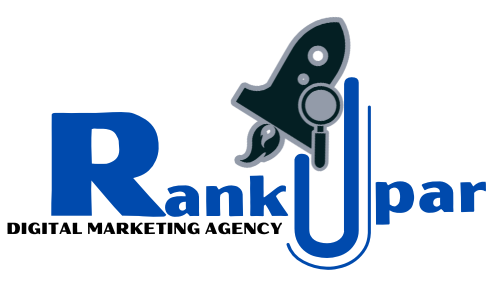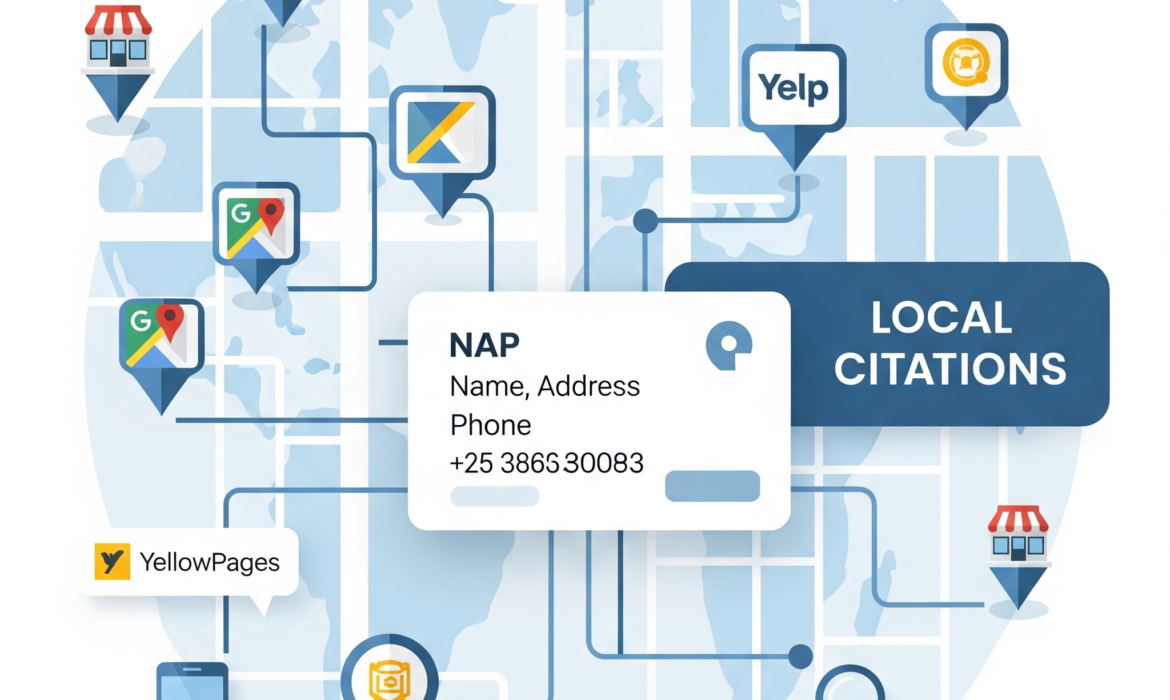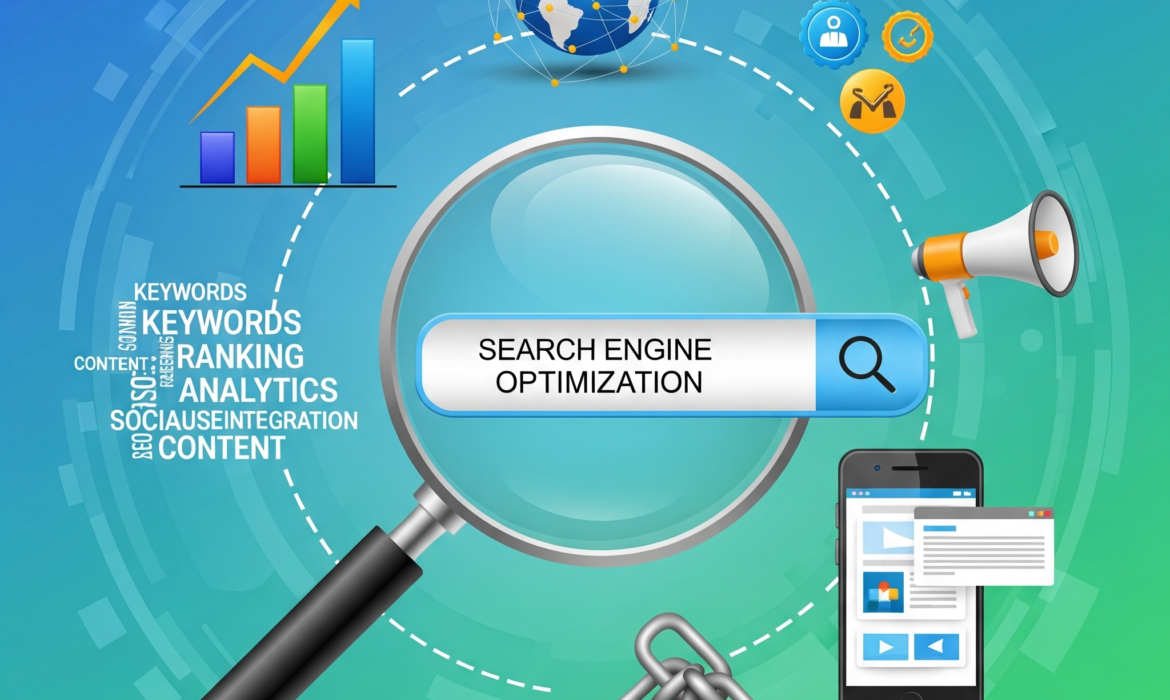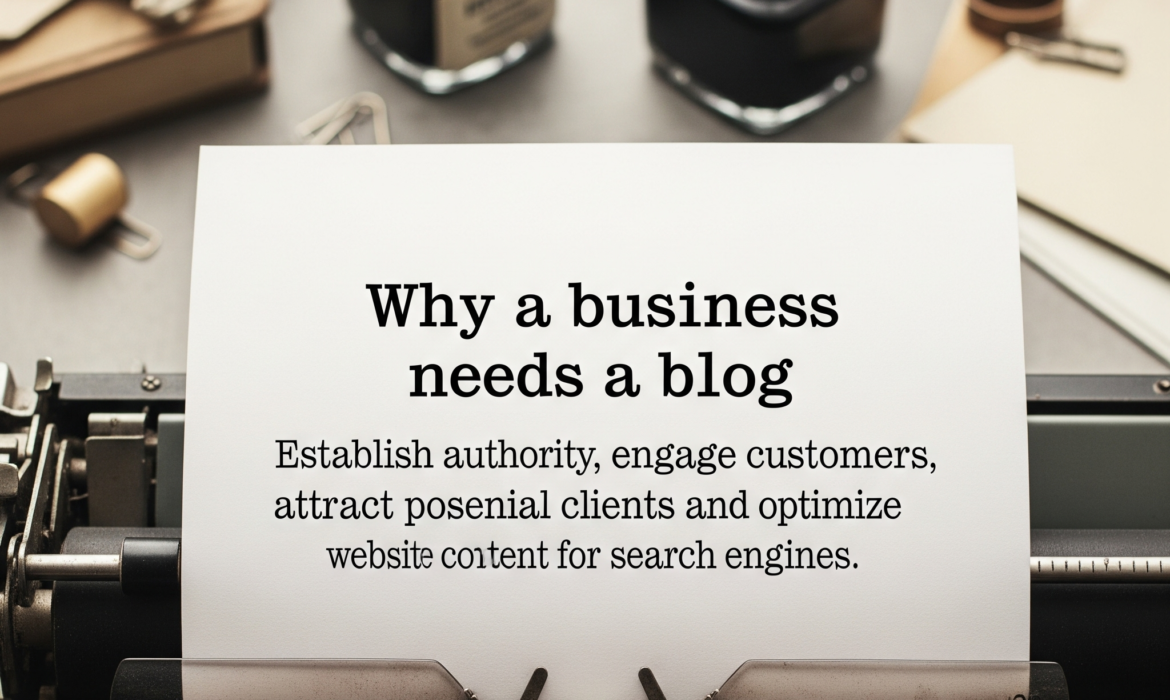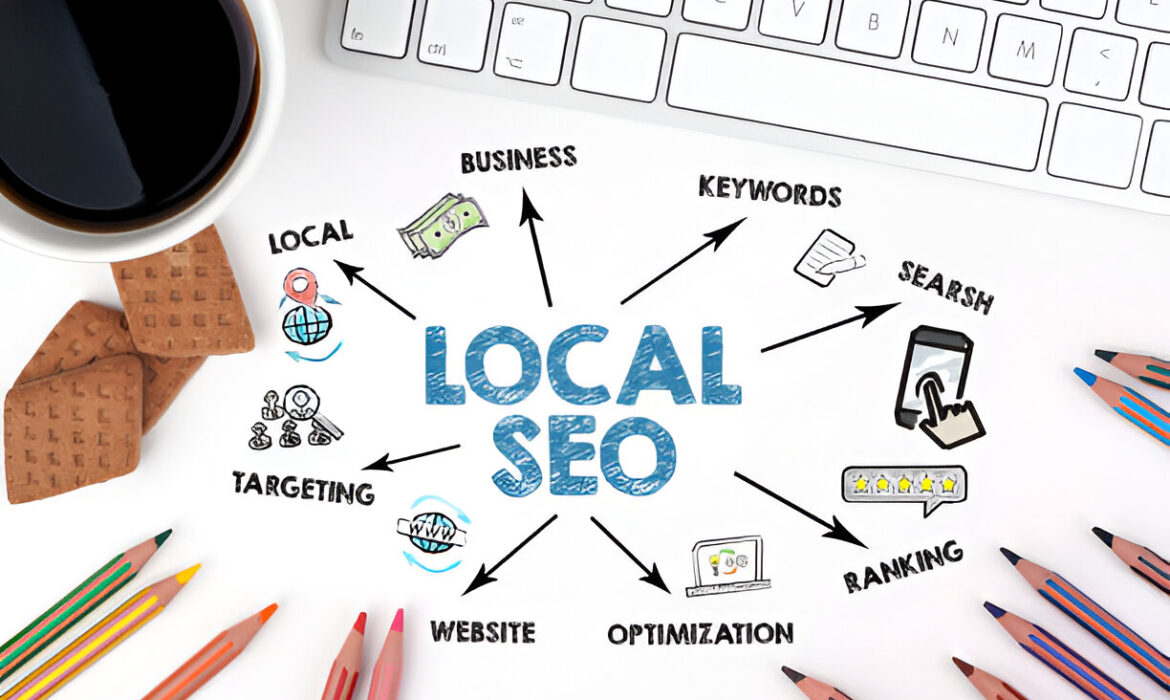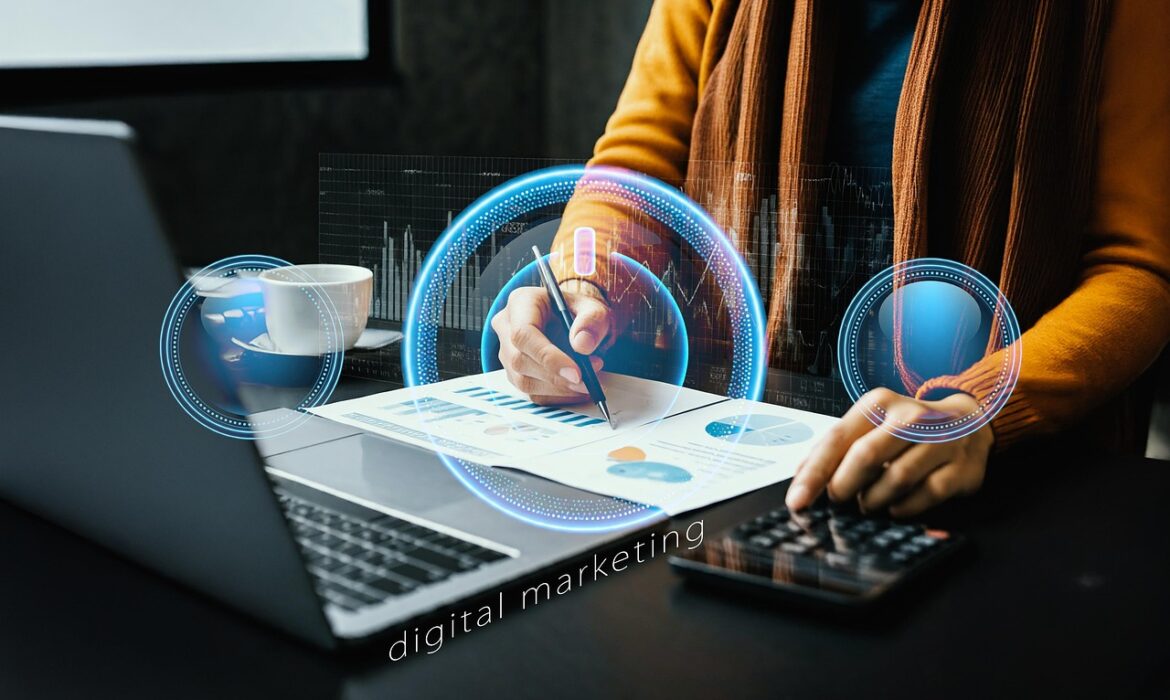+91 8828215493
Local Citations in 2025: Your Ultimate Guide to Dominating Local Search & AI Overviews
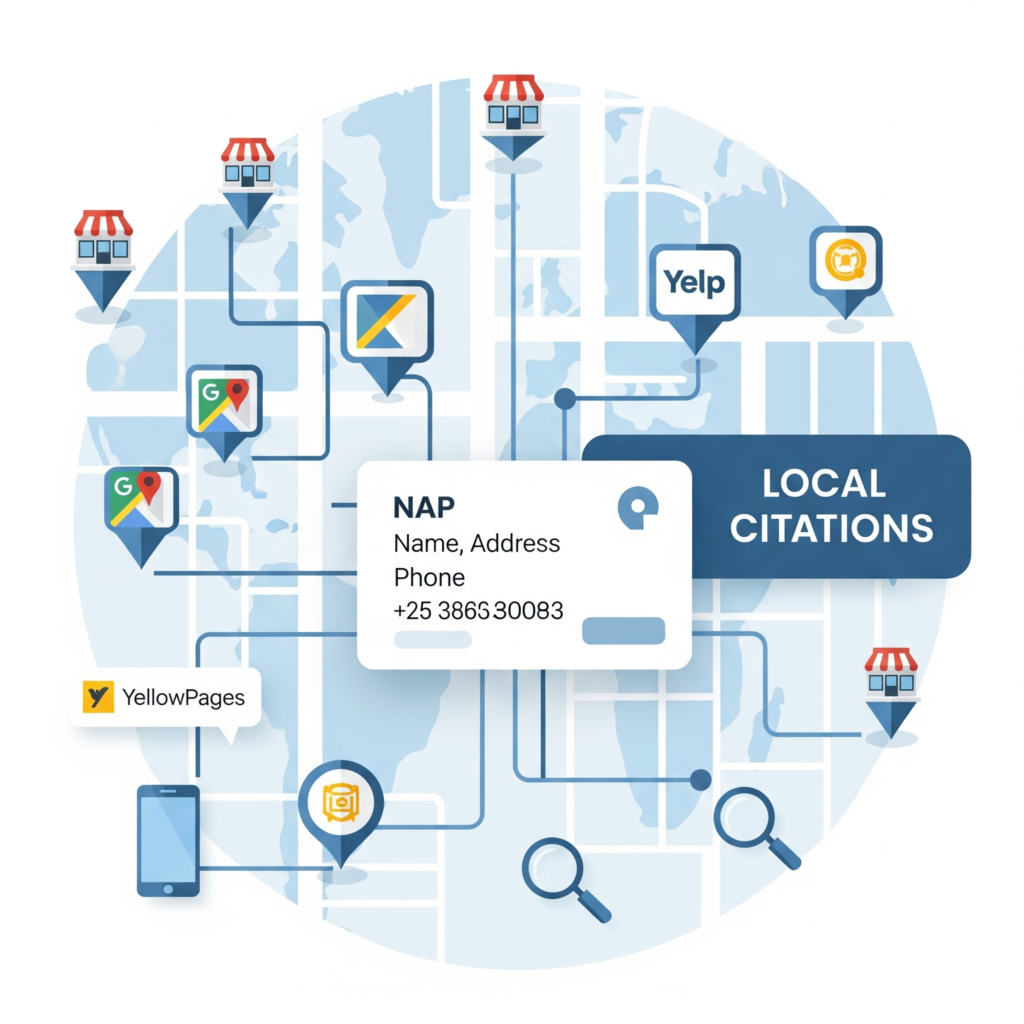
1. Introduction: Why Local Citations Are More Critical Than Ever for Your Business
Have you ever searched for a local coffee shop or a plumber on your phone? You’re not alone! A huge 76% of people who conduct a local search on their smartphone visit a physical place within 24 hours, and 28% of those searches lead to a sale. That’s a powerful statistic, showing a direct link between what happens online and the growth of your real-world business!
But here’s the thing: many amazing local businesses just like yours either don’t know about local citations or aren’t managing them correctly. This means they’re missing out on crucial local SEO benefits and potentially harming their online presence. We don’t want that for you!
That’s why we’ve put together this comprehensive guide. We’re going to walk you through everything, from the basic foundations to advanced strategies. Our goal is to make sure your business truly stands out in local search results and is totally prepared for the ever-evolving world of AI. Think of local citations as a foundational element for any successful local SEO strategy.
2. What Are Local Citations & Why Are They Your Local SEO Superpower?
Let’s start with the basics, shall we?
2.1 Defining Local Citations: The NAP Core
At its heart, a local citation is any online mention of your business’s Name, Address, and Phone number (NAP data). You’ll typically find these mentions on third-party websites, online directories, various apps, and even social media platforms.
While the “NAP” is the bare minimum, many websites offer you the chance to add lots more helpful information. This can include a link to your website, your operating hours, a detailed description of your business, eye-catching images, and even customer ratings. Citations can be either partial (meaning they might be missing one or more NAP elements) or complete.
2.2 Structured vs. Unstructured: Understanding the Types of Citations
You’ll encounter two main types of local citations:
• Structured Citations: These are the most common. Think of them as your business’s organized listings on well-known platforms like Google Business Profile (GBP), Yelp, Bing Places for Business, and Facebook. These platforms are typically huge, trusted databases that contain comprehensive and organized NAP details about your business.
• Unstructured Citations: These are mentions of your business’s information that aren’t grouped into a strict, organized listing format. You’ll often find these embedded within blog posts, news articles, social media posts, or forums. They don’t have to include your full NAP, just a mention of your business in some way.
Both types of citations are super important for building a strong online presence for your business. Regularly monitoring and updating your citations ensures trustworthiness and a positive user experience.
2.3 The Undeniable Impact: How Citations Boost Your Business
So, why go through all this effort? Because local citations are incredibly powerful for your local SEO!
• Key Local Ranking Factor: Citations are a significant ranking factor for local SEO, sending strong signals to Google that help it verify your business’s existence and legitimacy. The quantity, accuracy, and quality of your listings all play a role in how Google perceives your online presence.
• Increased Online Visibility: Appearing on local sites and relevant directories puts your business directly in front of more potential customers. This means better visibility in Google Maps and local search packs.
• Builds Trust & Credibility: A consistent and accurate online presence builds trust not only with search engines but also with potential customers. Remember, 93% of consumers are discouraged by incorrect details, and 80% say inconsistencies reduce their trust.
• Drives Targeted Leads & Conversions: With increased visibility in local searches, your business becomes easier for users actively looking for your products or services in your area to discover. This can lead to more traffic and higher chances of conversions.
• Provides a Competitive Advantage: Enhanced brand visibility, credibility, and targeted website traffic from local citations empower your business to stand out from competitors in crowded digital markets. It’s a sustained investment that, as your online presence grows, improves your chances of attracting and retaining customers, ultimately boosting your Return On Investment (ROI).
• Piggyback Page One Results: Did you know some online business directories, like Yelp and YellowPages, often “dominate page one of local search”? If you can’t beat ’em, join ’em! Listing your business on these platforms gives you other opportunities to grab that valuable page-one real estate.
• Earn Referral Traffic: Many people are loyal to specific citation platforms. For example, some “foodies are trained to go to Yelp when looking for new restaurants before going to Google”. Getting listed on relevant directories can earn your business valuable referral traffic.
2.4 Citations vs. Links: Understanding the Critical Distinction
It’s easy to confuse citations with link building, but they’re quite different, even though both are important for SEO.
• Similarities: Both are online references to your business, often appearing on third-party sites, and they can even exist on the same page. If managed incorrectly or if they go against Google’s guidelines, both can negatively affect your rankings.
• Differences:
◦ A citation must include your Business Name, Address, and Phone Number (NAP), but a link doesn’t have to.
◦ A link must be clickable, while a citation doesn’t have to be.
◦ All citations must be consistent, whereas links should be varied.
◦ Links improve rankings for both organic search results and local business search results, while citations primarily improve rankings in local results.
• The Value: While not every citation includes a direct link, and not every link passes full “link juice,” citations are a cornerstone of local SEO. They build trust, verify your business, and send significant signals to search engines about your local relevance. To truly maximize your online visibility, you need to build both!
3. The New Frontier: Local Citations in the Age of AI
The digital landscape is always changing, and right now, AI is a game-changer for local search. This means how you manage your local citations is more important than ever!
3.1 Winning in AI Overviews and Maps Packs
AI is “transforming local SEO” and presents exciting new opportunities for businesses like yours to “win in AI Overviews and Maps Packs”. If you have multiple locations, this is especially vital for “protecting and enhancing multi-location visibility in 2025”.
3.2 Unstructured Citations: AI’s New Content Snippets
Here’s an interesting shift: unstructured citations are “increasingly valuable as AI tools begin to pick them up as content snippets”. This means that even a mention of your business in a blog post or news article, where your NAP might not be formally grouped, can be recognized and utilized by AI.
3.3 Preparing Your Business for Generative AI Responses
Your goal is to ensure your brand’s content surfaces in conversational and generative artificial intelligence tools. Having accurate citations and well-optimized non-NAP details (like detailed descriptions and categories) boosts your “likelihood to appear in local pack and localized organic rankings as well as AI/Answer Engine results”. By providing comprehensive and consistent information, you’re essentially training AI to give better, more accurate responses about your business!
4. Building Your Local Citation Powerhouse: Step-by-Step Strategies
Ready to start building? Let’s walk through the process together!
4.1 The Essential Starting Point: Auditing & Prioritizing
Before you dive in, take a deep breath and:
• Begin by auditing platforms: “Check your online profiles for any missing information or inconsistencies”. This helps you see where you’re starting from!
• Tools to help: Moz offers a free local listing score tool, and Semrush has a free citation audit that scans for issues. These can save you a lot of time!
• Prioritize Smartly: While quantity is important, you don’t need to stress about listing your business everywhere. “Quality is always better than quantity”. A good rule of thumb is to start with the online business directories most relevant to your industry.
4.2 Must-Have Platforms: The Core of Your Citation Strategy
These are the “must-have” platforms where your business absolutely needs a strong presence:
• Google Business Profile (GBP): This is probably the most important platform. Make sure to claim, verify, and fully optimize your profile with business hours, reviews, services, a map, and photos.
• Yelp: A very popular directory, often one of the first local citation sites to appear in searches. Create or claim your listing and fill out all the essential details.
• Bing Places for Business: Bing’s alternative to GBP, it attracts millions of daily visitors, making it well worth optimizing your profile.
• Facebook Business Page: A free way to set up a business page, engage with customers, and share updates.
• Apple Business Connect: Helps searchers find you across all Apple properties.
4.3 Data Aggregators: The Broad Reach
Think of data aggregators as super-distributors for your business information:
• What they are: Companies like InfoGroup (Express Update), Neustar Localeze, and Data Axle (formerly Factual/Birdeye) collect your business data and then share it with a huge network of other online directories and platforms.
• Why they’re important: Getting listed with these aggregators is a crucial step to efficiently distribute your business data to hundreds of other websites. Claiming and managing your listings with them is often free.
4.4 Niche & Hyper-Local: Finding Your Audience
Beyond the big names, think about where your specific customers are looking:
• Industry-Specific Directories: “Category relevancy is more important than domain authority” for local SEO. For example, HealthGrades is critical for healthcare companies because potential customers actively use it to find doctors. Other examples include Open Table or TripAdvisor for restaurants.
• Local Associations: Joining your local Chamber of Commerce, small business associations, or local event groups like Nextdoor is an easy win.
• Tip: If you need help finding these, “Moz – Citations by Category” and “WhiteSpark – Best Citations by Category” are great resources for industry-specific lists. BrightLocal also offers lists of popular directories.
4.5 Earning Unstructured Citations: Creative, Budget-Friendly Tactics
Unstructured citations are mentions in articles, blogs, or social media. They’re increasingly valuable, especially as AI tools pick them up as content snippets. Here’s how to earn them, even on a budget:
• Local Community Engagement: Sponsor a local event, participate in a charity drive, or support school programs. These activities often lead to mentions in local news or community blogs.
• Content Marketing with a Local Hook: Create blog posts or resources on your website that are highly relevant to your local community. Think “Top 10 Family-Friendly Activities in [Your City]” or “Best Local [Industry] Tips.” This can encourage local mentions and shares.
• Leverage Existing Networks: Check your suppliers’ websites – sometimes they list their clients! You can also look at your competitors’ backlink profiles using tools like Ahrefs’ Site Explorer to find new opportunities.
• HARO (Help A Reporter Out): Sign up for HARO to connect with journalists who are looking for expert sources. Offering your expertise can get your business cited in news articles.
5. Optimizing Beyond NAP: Maximize Your Visibility & Trust
Just having citations isn’t enough; you need to make them work for you!
5.1 NAP Consistency: The Golden Rule & How to Troubleshoot
This is perhaps the most critical best practice for local citations.
• Absolute Consistency: Your business Name, Address, and Phone number (NAP) must be identical across every single online platform where your business is listed.
• Why it’s Crucial: Inconsistent details can completely confuse potential customers. In fact, 93% of consumers are discouraged by incorrect details, and 80% say inconsistencies reduce their trust. Even “seemingly insignificant differences, such as spellings and abbreviations,” can cause problems in Google’s eyes, impacting your reputation and decreasing its trust in your business.
• Common Pitfalls & Troubleshooting: Be incredibly meticulous! Watch out for variations like “St.” vs. “Street,” “Suite A” vs. simply “A,” different phone number formats (with/without hyphens), or old business names/addresses.
• Actionable Advice: Any changes to your business details “should be reflected across all local citations to maintain an online identity”. Sometimes, automated tools can’t fix everything, so be prepared for manual intervention when necessary.
5.2 Rich Business Profiles: More Than Just the Basics
Don’t stop at just NAP. Maximize the full potential of your business profile by providing ample details:
• Strategic Website Links: Instead of just linking to your homepage, a “better approach is to link directly to the location page”. This makes it easier for users and provides better signals for search engines.
• Detailed Business Descriptions: Craft descriptions that are compelling and include your top keywords. This helps improve local rankings and allows search engines (and AI) to better understand what your business offers.
• Leverage Business Categories: Utilize all available categories – both primary and secondary (if supported by the platform, like Google Business Profile). This helps you rank for a wider range of targeted keywords.
• High-Quality Images: Add photos of your business, products, or services. If the directory allows, optimize the image file name and alt text. This not only improves customer conversion rates but can also help you rank in image searches.
• Complete Operating Hours & Contact Details: Always provide accurate, up-to-date operating hours, social media links, and email addresses. This gives customers a complete and clear picture of your business.
5.3 Proactive Review Management: Building Social Proof
Customer reviews are incredibly powerful!
• Actively Encourage Reviews: Make it a point to encourage your satisfied customers to leave positive reviews on platforms like Google Business Profile and other relevant review sites.
• Impact: “Having great reviews not only helps you earn new business but can also improve your rankings”. Google “looks at review sentiment on 3rd party sites to gauge the quality of businesses”. Customer testimonials “act as social evidence, enhancing your business’s online reputation and drawing referrals”.
• Best Practice: Regularly monitor and respond to all reviews—positive and negative. This shows that you appreciate customer feedback and are dedicated to improving their experience.
5.4 Strategic Keyword Usage:
Keywords aren’t just for your website content!
• Key Points: Incorporate “regular and long tail keywords” into your business descriptions and profiles. You want your keywords to be precise to attract the right local leads. For example, there’s a big difference between “Building Contractor California” and “Emergency Roofing Contractor California”.
6. Managing & Maintaining Your Citations: Long-Term Success
Building citations is a great start, but managing them over time is how you achieve lasting success.
6.1 Choosing the Right Citation Management Tools
These tools can be a huge help in streamlining the process of building, managing, and tracking your citations.
• What to Look For: When choosing a tool, consider:
◦ Citation Variety: Does it offer industry-specific directories? Can you select specific directories, or does it pick for you?
◦ Setup Method: Does it use direct APIs to directories or data aggregators?
◦ Duplicate Suppression: How easy and accurate is its duplicate detection and management?
◦ Tracking: What kind of tracking features does it offer, and how accurate are they?
◦ Price: Does it fit your budget compared to other tools with similar features?
• Popular Tools: You’ll often see BrightLocal, WhiteSpark, Semrush Local Citation Builder, Moz Local, and Uberall recommended. BrightLocal, for example, allows you to submit listings to over 100 sites and helps clear up duplicates. Semrush offers a free citation audit for up to five locations daily.
6.2 Regular Audits & Monitoring: Staying Current
Citations aren’t a “set it and forget it” task!
• Why it’s Important: Businesses can lose citations for various reasons, so “it’s important to track the status of your citations”. Regularly monitoring and updating your citations “enhances your brand’s trustworthiness and also offers a positive user experience”.
• Recommended Cadence: While the sources don’t give a specific timeline, consider auditing your citations at least once a quarter or annually.
• Triggers for Immediate Action: Any major business changes—like a rebranding, a new phone number, new services, or even significant Google algorithm updates—should prompt an immediate re-audit.
• Tools for Tracking Status: If your chosen management tool doesn’t track live citation status, external tools can help. Little Warden (a paid but affordable tool) can monitor response codes for your citation URLs and email you if any disappear. The paid version of Screaming Frog is also very affordable and can schedule crawls of your URLs to check their response codes.
6.3 Tracking Performance: Measuring Your ROI
You’ve invested time and effort, so you want to know if it’s paying off!
• The Challenge: While many tools track citation status, “none of them can track how they perform on your website” directly.
• The Solution: A far simpler option is to add UTM tracking to the URLs you use in your citations. For example: https://www.mywebsite.com/location/cityname?utm_source=citation&utm_medium=referral.
• The Benefit: Using this method, you can easily track the global performance of your citation efforts in Google Analytics by simply searching for “citation” under the Source/Medium report.
6.4 Handling Business Changes: Moves, Closures, Rebranding
Life happens, and sometimes your business details change. Here’s how to manage citations when they do:
• Business Moves: If your business changes location, it’s absolutely critical to update and resolve all citations “without delay”. Otherwise, you risk “accidentally directing potential customers to your old business location,” which leads to frustration and lost sales. BrightLocal, for instance, provides specific guidance on “Managing Local Citations When a Business Moves Location”.
• Business Closures/Acquisitions: When a business closes or is acquired and rebranded, strategically manage or “sunset” old citations. This prevents conflicting information from confusing customers and ensures search engines have the most current, accurate representation of your business.
• Rebranding: Just like with NAP data, ensure any new business names, logos, or branding elements are updated consistently across all platforms.
7. Special Considerations: Service Area Businesses (SABs)
If you run a service-based business (like a plumber, electrician, or mobile pet groomer) that doesn’t have a storefront, you have unique challenges when it comes to citations.
7.1 Unique Challenges for Service-Based Businesses
• No Storefront: SABs typically don’t have a physical location that customers visit. Their address might be a home office, which they often prefer to keep private.
• Defining Service Areas: Instead of a single point, SABs serve a specific geographic region, and accurately defining this area in citations is key.
7.2 Strategic Citation Building for Service-Area Businesses
• Google Business Profile (GBP): Register your GBP with a verifiable address (your home office, for example), but make sure to set your GBP as a “service area business.” This hides your physical address from public view, only showing your defined service areas.
• Focus on Service Areas: Across all your citation platforms, emphasize the specific geographic regions you serve within your business descriptions, categories, and any other available fields.
• Mobile-First Approach: Ensure all your citations clearly communicate the nature of your service (e.g., “mobile service available,” “by appointment only,” “at-home appointments”) to manage customer expectations.
8. Conclusion: Your Path to Local Search Dominance
Phew! You’ve made it through the ultimate guide to local citations. We hope you’re feeling empowered and ready to tackle your local SEO!
Remember, building local citations is a tried-and-true strategy that “builds visibility, increases credibility, and enhances local SEO”. It’s a sustained investment that significantly improves your online presence and ultimately boosts your Return On Investment (ROI).
So, don’t wait! Start auditing and building your citations today. Always prioritize quality and relevance over sheer quantity. By focusing on a robust, optimized, and consistently managed citation strategy, you’re not just preparing for today’s search results—you’re future-proofing your business for the dynamic, AI-driven local search landscape of 2025 and beyond!
If you want to boost your local business visibility and attract more customers through effective local citations, our team at Rank Upar is here to help. From setting up accurate listings to optimizing your digital presence, we ensure your business stands out in local searches. Ready to take your business to the next level? Contact us today and let’s get started!
What is local citation building?
Local citation building means creating profiles on third-party directories and websites that list your business’s Name, Address, and Phone number (NAP). Creating a consistent, accurate profile across multiple platforms can enhance your business visibility and attract more local leads while building trust among searchers
Why is citation building important for SEO?
Citation building is a critical part of local SEO because it directly influences your local rankings. These citations build credibility and trust with search engines, helping them verify your business’s existence and local relevance
How does citation building impact a business’s online visibility and local search rankings?
The more accurate and reputable mentions your business has online, the easier it is for searchers to find you. A business listing on several high-profile platforms makes you more likely to appear prominently in local search results and drive more visitors to your website
What is the difference between structured and unstructured citations in local SEO?
Structured citations are standardized listings found on business directories like Google Business Profile and Yelp. They present your full NAP details in an organized format, often including maps, images, and other details. Unstructured citations refer to mentions of your business within contextual content like blog posts, news articles, social media posts, or forums, where the information isn’t strictly formatted and may even be partial. Both are valuable!
What are the primary sources or platforms for building citations for local businesses?
The most high-profile and “must-have” directories include Google Business Profile, Facebook Business Page, Yelp, and Bing Places for Business. Other key sources include industry-specific directories (like HealthGrades, OpenTable, Angi, TripAdvisor), local Chambers of Commerce, and data aggregators like Express Update and Neustar Localeze.
What are the best practices when building citations?
The best practices include filling out your local citations as completely as possible, always ensuring your Name, Address, and Phone number (NAP) are absolutely consistent and up-to-date across all directories. Add high-quality images, optimize your content with regular and long-tail keywords, and actively encourage customer reviews. Remember to prioritize quality over quantity, choosing well-established and relevant niche sites where your potential customers are likely to be.
What is the importance of NAP consistency (Name, Address, Phone number) in citation building?
NAP consistency is paramount!. Consistency builds trust with potential customers (as 93% are discouraged by incorrect details) and with search engines. Accurate and consistent NAP details help your visibility, validate your business’s location and credibility, and are crucial for ranking well in local searches, including voice search. Even “seemingly insignificant differences” can cause problems
The Importance of SEO Marketing: Definition, Types, Benefits, and How to Improve Your Online Presence
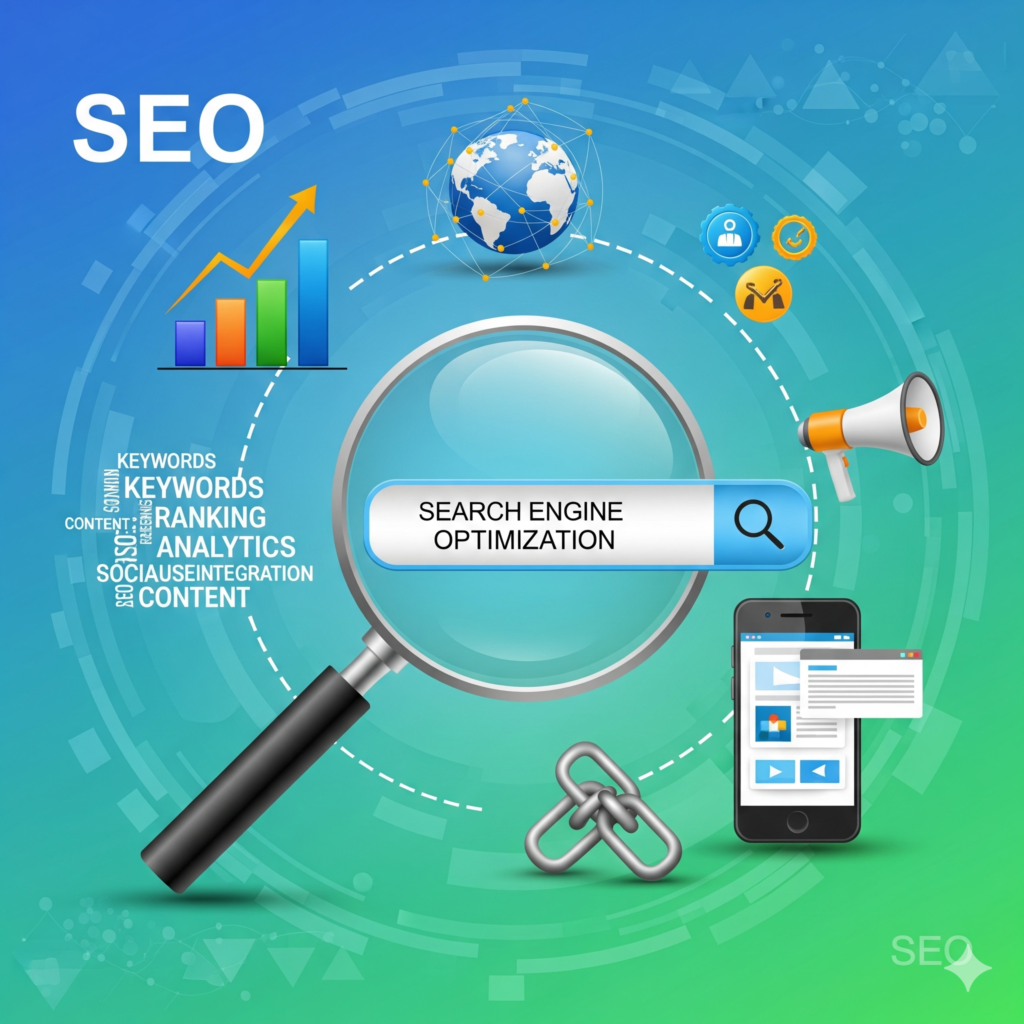
Hello there! Ever wondered how some businesses seem to effortlessly pop up at the top of your search results, while others get lost in the digital abyss? The secret often lies in something called SEO, or Search Engine Optimization. As we turn the page from 2024 to 2025, the importance of SEO for helping your business grow is truly immense, and it’s something you definitely don’t want to overlook.
You’ve likely heard the term “SEO” thrown around, perhaps knowing it’s a useful digital marketing tool. But what exactly does it mean today, and why is it so incredibly important? Think of it as your brand’s compass and map for the vast online world.
In this friendly guide, we’re going to break down what search optimization actually is, why it’s a game-changer for sustainable growth and lead generation, and how you can start implementing some best practices to make your brand more discoverable than ever online.
——————————————————————————–
What Exactly is SEO?
Let’s get straight to it: SEO is all about increasing the quantity and quality of traffic to your website through organic search engine results. What does “organic” mean? It simply refers to the non-paid listings you see when you search on Google, Bing, or other search engines. It’s about earning your spot, not buying it.
The main goals of SEO are pretty straightforward:
• Boost your brand’s visibility online.
• Drive more organic traffic to your site.
• Give you more opportunities to convert those curious visitors into loyal customers.
• Help establish your brand as a trustworthy authority in your industry.
• Improve the user’s experience with your brand and website.
Ultimately, SEO isn’t just a quick fix; it’s a long-term strategy that consistently helps attract visitors, generate leads and sales, and build valuable brand awareness over time. When you do it right, your brand can really stand out from the crowd.
——————————————————————————–
Why SEO is More Important Than Ever?
So, why should you care about SEO right now? Here are some compelling reasons:
• Enhanced Visibility and Rankings When you search for something online, where do you usually click? Most people stick to the top few results. In fact, over 25% of people click the very first search result they see. If your business isn’t on that first page, you’re practically invisible! SEO helps you climb those ranks, making potential customers much more likely to find you. Even if they don’t click right away, simply seeing your brand repeatedly makes them more familiar with you, making them more likely to search for you directly in the future.
• Increased Web Traffic It’s simple: if potential customers can’t find your website, you’re missing out on sales opportunities. SEO directly increases the number of relevant people visiting your site each day. More visitors mean more chances to connect, engage, and ultimately, sell your products or services.
• Building Trust and Authority Did you know that users tend to trust the recommendations that search engines provide? When your site consistently ranks higher on platforms like Google, it signals to potential customers that you are a reliable and authoritative source in your industry. A well-optimized site doesn’t just look good to search engines; it also earns the trust of your audience.
• Improved User Experience (UX) Google absolutely loves websites that offer a great user experience, and it’s a major ranking factor. This means that when you optimize your site for search engines, you’re also optimizing it for your users! A well-optimized site clearly communicates what you offer, how to get it, and answers any questions easily. If users struggle to navigate your site, search engines likely will too, which can hurt your rankings and traffic.
• Sustainable Business Growth There’s no doubt that SEO is incredibly important for your brand’s growth. The higher you rank for relevant keywords, the more organic (non-paid) traffic your site will naturally receive. This translates into more leads, more customers, and more sales. Plus, people who find your site through a search engine are often more likely to share your brand across social media platforms.
• Cost-Effectiveness and High ROI Compared to many other marketing channels, SEO is often incredibly cost-effective. You don’t pay for ads, clicks, or views in the organic results. While there’s an investment in content creation and optimization, once you achieve those high rankings, you can maintain them with relatively less effort and cost over the long term. SEO delivers a high return on investment because it focuses on attracting users who are already interested in what you offer.
• Awareness of Market Trends Think of keyword research as your window into what your audience is actively searching for. By analyzing these search terms, you can spot emerging trends or declining interests in your niche. These insights are invaluable for guiding your product development, refining your marketing campaigns, and staying ahead of the curve.
• Quantifiable Results Unlike some marketing efforts, SEO results are highly measurable. You can track your organic rankings, website traffic, and conversions, allowing you to clearly see what’s working and where you might need to adjust your strategy. This means you can prove the tangible benefits SEO brings to your business.
• Protecting Your Brand SEO also plays a crucial role in managing your online reputation. When people search for your brand, you want to ensure the top results are positive and accurate. If incorrect information or negative reviews pop up prominently, it can harm your brand’s image. SEO helps you control those search results and protect your relationships with potential customers.
——————————————————————————–
The Pillars of SEO: Key Elements and Types
SEO isn’t just one thing; it’s a collection of practices that fall into several important categories. Let’s break down the main types you’ll encounter.
On-Site SEO
On-site SEO refers to all the improvements you make directly on your website’s content to ensure it’s friendly to both search engines and users. It’s about signaling to search engines exactly what each webpage is about in various ways.
Key areas to focus on for on-site SEO include:
• Keyword Selection: This is fundamental! The keywords you choose are incredibly important for your SEO success. It involves researching specific words or phrases people use in search engines and centering your content around them. The sweet spot is finding keywords with high relevance, high volume, and achievable difficulty.
• Content Optimization: Your content is how you connect with your audience. It should be educational, engaging, and shareable, providing valuable information that users are actively searching for. For example, if you sell window treatments, a series of blog posts explaining different types of blinds or smart home automation can bring potential customers to your site.
• SEO Titles and Meta Descriptions: When Google shows search results, it displays a “snippet” of information for each page. The main parts of this snippet are your SEO title and meta description. These are golden opportunities to include crucial keywords and encourage clicks.
• Linking Structure (Internal Links): This involves linking from one page to another on your own site that has related content. It makes it easier for users to find what they need and helps search engines crawl and understand your entire website more effectively.
• Image Alt Attributes: Google looks at more than just text! Image alt attributes are text descriptions associated with images. They serve two purposes: providing alternative text if an image doesn’t load and helping screen readers for visually impaired users. It’s a great place to include keywords if they naturally describe the image content.
Local SEO:
If you have a physical business or serve a specific geographic area, Local SEO is your best friend. Search engines use a user’s location to provide relevant, nearby suggestions. If your business isn’t showing up when it should, customers will likely go elsewhere.
To boost your local SEO, focus on:
• Using local keywords (e.g., “best sushi in Austin”).
• Claiming your directory listings.
• Customizing information on platforms like Google Business Profiles and Google Maps.
• Establishing a clear and consistent local footprint across various platforms.
Off-Site SEO:
Off-site SEO involves efforts made outside your website to improve its ranking. The most crucial element here is link building, also known as backlinks. Backlinks are when other reputable, high-traffic websites link back to your site. These act as powerful signals of trust and authority to search engines, significantly influencing your ranking. Just be sure to get links from well-known and trusted sites, and never use “black hat” (tricky, unethical) tactics, as these can lead to penalties or even bans.
Technical SEO:
Technical SEO focuses on optimizing the technical components of your website to help search engines crawl, index, and display it more effectively. It ensures your website is fast, secure, and easy for both users and search engine bots to navigate.
Key technical aspects include:
• Website Load Speeds: A slow site can hurt user experience and rankings.
• Mobile-Friendliness: With most traffic coming from mobile devices, your site must display correctly and be easy to use on phones and tablets.
• Site Structure: A straightforward site structure helps search engines understand your content.
• Security (HTTPS): A secure website is a must for trust and rankings.
• XML Sitemaps and Robots.txt: These files help search engines effectively crawl and index your site.
Other Types of SEO:
While the above are major categories, SEO is broad and includes other specialized types:
• E-commerce SEO: Optimizing online stores to rank better for product searches.
• Mobile SEO: Specifically ensuring your site is perfect for mobile and tablet users.
• Voice Search SEO: Optimizing content for natural language queries used in voice assistants.
• Video SEO: Making your videos more discoverable in search results.
• International SEO: Targeting audiences in different languages and countries.
• Content SEO: Creating fresh, well-structured content (text, images, videos) with a solid keyword strategy.
——————————————————————————–
How to Boost Your SEO Marketing Efforts
Ready to roll up your sleeves? Here are some actionable ways to improve your SEO marketing results:
• Create High-Quality, Relevant Content: This is paramount! Your content should be informative, engaging, and directly relevant to your target audience’s keywords. Think about the questions your customers ask and provide valuable answers.
• Optimize Your Website for Relevant Keywords: Once you have your keywords, use them naturally throughout your website – in page titles, meta descriptions, headings, and body copy. Just be careful to avoid keyword stuffing, which can actually hurt your rankings.
• Build High-Quality Backlinks: Seek out opportunities to get other reputable websites to link back to yours. This can involve guest blogging, submitting your site to relevant directories, or creating amazing content that others naturally want to reference.
• Ensure Mobile Optimization: With the majority of internet traffic coming from mobile devices, your website must be designed to be flexible and easily accessible on phones and tablets. Test your site on mobile to identify any issues.
• Promote Your Website on Social Media: Social platforms are excellent for promoting your content and increasing your visibility. While social links might not directly boost SEO, they can indirectly help by generating traffic and increasing brand awareness, potentially leading to backlinks.
• Regularly Track and Adjust Your Strategy: SEO is an ongoing process. Use tools like Google Analytics or Semrush to monitor your website’s performance, track rankings, and measure traffic. This data will help you understand what’s working and what needs tweaking.
• Target Long-Tail Keywords: These are more specific, longer phrases that users type into search engines. They often indicate clearer search intent and are typically easier to rank for than broad, highly competitive keywords.
• Perform Competitive Analysis: Take a peek at what your competitors are doing! Understand which keywords they’re targeting and how they’re ranking. This can reveal opportunities for you to create even better content and outrank them.
• Optimize Your Images: Don’t forget your visuals! Use descriptive keywords in your image file names and write helpful “alt text” for all images. Also, ensure your images are compressed and in efficient file formats (like .png or .webp) to keep your site loading quickly.
——————————————————————————–
The Future of SEO: Trends to Watch in 2025
The world of SEO is always evolving. Here are a few key trends to keep an eye on as we move into 2025:
• Generative AI for Content Creation and Optimization: Artificial intelligence is already impacting marketing, and SEO is no exception. Tools are emerging that can help you generate marketing copy and optimize it for keywords.
• Increased Topical Authority: Google is increasingly emphasizing E-E-A-T (Expertise, Experience, Authoritativeness, and Trustworthiness). This means that while AI can assist, content still needs human input, real experience, and factual accuracy to rank well. You’ll want to demonstrate your credibility, whether through professional certifications, extensive industry experience, or being featured in leading publications.
• Rise of Zero-Click Searches: Sometimes, users just want a quick answer without clicking through to a website. This is where zero-click searches come in, with features like Featured Snippets, AI Overviews, Knowledge Panels, and “People Also Ask” boxes. To appear in these, you’ll need to create high-quality content that directly answers search queries and is formatted to make those answers easy for search engines to extract.
——————————————————————————–
Let’s Conquer SEO Together!
So, there you have it! SEO is not just a passing fad; it’s an essential and enduring practice that can significantly boost your business’s online presence. By focusing on high-quality content, smart keyword optimization, strong backlinks, and a user-friendly website, you’re setting yourself up for success.
Remember, SEO should be approached as a positive practice with long-term benefits, rather than an exact science with immediate results. Your rankings will depend on your industry and competition, but consistent effort pays off.
If you’re feeling a little overwhelmed or simply want experts on your side to keep up with Google’s ever-changing algorithms.
For inquiries regarding your SEO needs and to enhance your brand’s online discoverability, Rankupar Digital Marketing Agency experts can assist. If you have questions or are looking to build steady, reliable leads for your brand, connecting with experts can help discuss how SEO can be integrated into your strategy.
The Unseen Power of Content Marketing

In today’s dynamic digital landscape, content marketing has emerged as a powerful and indispensable strategy for organizations aiming to connect with potential customers and foster sustainable growth. Far beyond mere promotional efforts, content marketing focuses on creating and distributing valuable, informative, and engaging content that addresses an audience’s questions and needs, thereby establishing a foundation of trust and relationship-building. This approach consistently proves its worth, influencing audience decision-making more profoundly than many other techniques. This article delves into the primary benefits that underscore the strategic importance of content marketing.
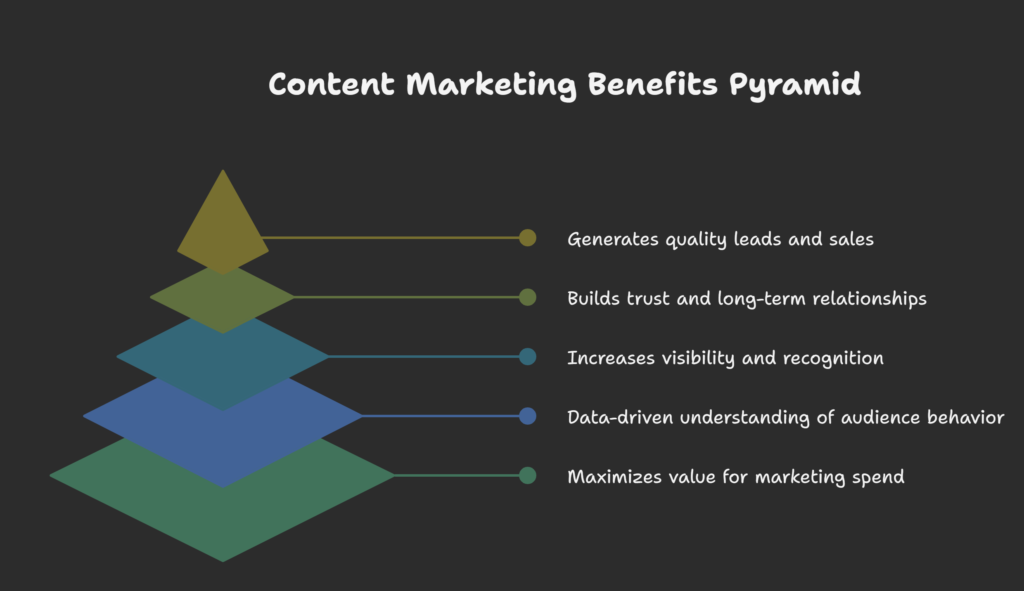
1. Enhancing Conversions and Generating Quality Leads
One of the most direct and tangible benefits of content marketing is its capacity to increase conversions and generate high-quality leads. By providing clarity and reassurance, great content equips individuals with the information necessary to advance in their buyer’s journey, whether that involves subscribing to a newsletter, requesting a product demonstration, or making a direct purchase. For instance, a retailer offering comprehensive informational content—such as setup guides, troubleshooting tips, customer support details, and reviews—is significantly more likely to convert a hesitant shopper than one providing only basic product specifications. Content serves as an effective conduit to guide users to landing pages, where well-placed calls-to-action (CTAs) encourage further engagement, turning delighted visitors into valuable leads for sales teams.
2. Cultivating Trust, Strengthening Relationships, and Fostering Loyalty
Content marketing is fundamentally about consistently attracting and engaging customers, leading to the strengthening of customer relationships and the cultivation of loyal brand advocates. When businesses provide value without immediately seeking a return, their audience develops trust in their advice and recommendations. This trust is paramount, as research indicates that 95% of buyer decision-making occurs in the subconscious mind, meaning emotional connections are powerful drivers of sales. Effective brand storytelling, delivered through various content forms like blog posts, social media updates, and case studies, can deeply resonate with an audience by showing empathy, offering a unique perspective, maintaining authenticity, and ensuring consistency in messaging and tone. Such efforts lead to customers feeling connected to a brand, boosting its reputation and fostering long-term loyalty.
3. Amplifying Brand Awareness and Online Visibility
For both established and nascent companies, content marketing is a cornerstone for growing brand awareness and increasing visibility. High-quality, search-optimized content naturally leads to higher rankings in search engine result pages (SERPs), making a business more discoverable to potential customers. Beyond search engines, valuable and interesting content inspires word-of-mouth recommendations, a profoundly influential channel given that 88% of consumers trust referrals from people they know. Engaging content, particularly on social media platforms, can significantly expand an audience reach, generating widespread positive mentions and increasing followers. This “Surround Sound” strategy ensures a brand’s content appears wherever potential customers seek information related to its products or services.
4. Establishing Industry Authority and Expertise
Consistent production of well-informed, product- and industry-related content positions a company as an authority and expert in its field. Demonstrating expertise instills trust, which an Edelman study found to be more effective than love at driving sales, with 61% of consumers advocating for brands they fully trust. To achieve this, content must be useful, solving the audience’s biggest challenges, and thought-leading, offering unique perspectives on industry topics. Businesses that serve as credible sources of information are not only trusted by customers but also favored by search engines, leading to higher rankings.
5. Driving Website Traffic and Optimizing SEO Performance
Helpful, SEO-driven content is a primary magnet for attracting potential customers to a website. Google’s algorithms prioritize connecting searchers with the most relevant and high-quality information, meaning that businesses focusing their inbound marketing efforts on audience needs are likely to rank higher, draw more clicks, and achieve greater engagement. Case studies, such as Voe Tranquilo increasing organic traffic by 588% and reducing customer acquisition costs by 66.5%, illustrate the profound impact of high-quality, search-optimized content on website traffic and revenue. Every new piece of content adds another indexed page, expanding opportunities for higher search engine rankings.
6. Engaging Ad-Wary Audiences
A significant challenge for modern marketers is reaching audiences who actively avoid advertisements. Content marketing provides an effective solution by allowing businesses to connect with ad-wary audiences. A substantial portion of consumers, particularly younger demographics like Gen Z (99% skip ads, 63% use ad blockers), prefer authentic voices over overt advertisements. By building a rich repository of useful, search-optimized content, businesses can organically capture the attention of these consumers who distrust or disengage with traditional ads, complementing paid strategies for optimal returns.
7. Maximizing Cost-Effectiveness
While initial investment in content creation might seem substantial, content marketing stands out as a highly cost-effective marketing strategy in the long run. Compared to ongoing media placement costs associated with paid advertisements, video marketing, or traditional campaigns, much of content marketing work can be done in-house, significantly keeping overall marketing costs down. Its ability to attract and retain customers by establishing credibility further enhances its long-term financial efficiency.
8. Gaining Data-Driven Insights into Your Audience
Content marketing is not merely a broadcast mechanism; it is a powerful tool for learning about your audience. By tracking engagement metrics through analytics tools like Google Analytics, businesses can gain a clear picture of their target demographic. Data reveals how people find content, their time spent on pages, device preferences, and demographic profiles. This data-driven insight enables marketers to refine future content strategies, ensuring greater relevance and effectiveness in targeting the right people. For example, observing that short blog posts with embedded videos drive more conversions might prompt an increased focus on video-based content.
9. Elevating Customer Experiences and Streamlining Service
Educational and actionable content plays a crucial role in enhancing customer experiences and easing the pressure on customer service teams. By proactively answering high-level and common questions through articles, videos, and support hubs (like Expedia’s), customer service staff are freed to address more complex inquiries and deliver personalized services. This empowerment of the audience to make informed decisions and understand products or processes reduces misunderstandings and friction, leading to positive reviews, word-of-mouth recommendations, and repeat purchases. Consumers are even willing to pay more for products when confident of an outstanding experience.
10. Streamlining the Sales Process and Guiding the Buyer’s Journey
Content marketing effectively streamlines the sales process by providing valuable resources that sales teams can leverage to convert leads more efficiently. Case studies, for example, offer real-world examples of product efficacy without the need for ad-lib storytelling, while polished demonstration videos can engage busy leads. Moreover, content marketing uniquely allows businesses to meet their audience at every stage of the buyer’s journey—Awareness, Consideration, and Decision. A potential customer, initially seeking solutions to a problem (Awareness), can be guided through research (Consideration) and ultimately to a purchase decision (Decision) by a consistent stream of relevant and helpful content, establishing the business as a trusted partner throughout.
Conclusion
The strategic adoption of content marketing offers a comprehensive suite of benefits, ranging from bolstering brand awareness and authority to driving conversions and enhancing customer loyalty. While the benefits may not always be immediate, requiring a period of trial and error and sustained effort, the long-term impact on a business’s growth, engagement, and retention is undeniable and substantial. By prioritizing high-quality, consistent, and audience-focused content, businesses can build a robust online presence, foster deeper connections with their customers, and ultimately secure a stronger position in their respective markets.
For any further questions about content marketing, or to discuss how these strategies can benefit your business, please don’t hesitate to contact us.
Why Your Business Needs a Blog (Yes, Even Today!)
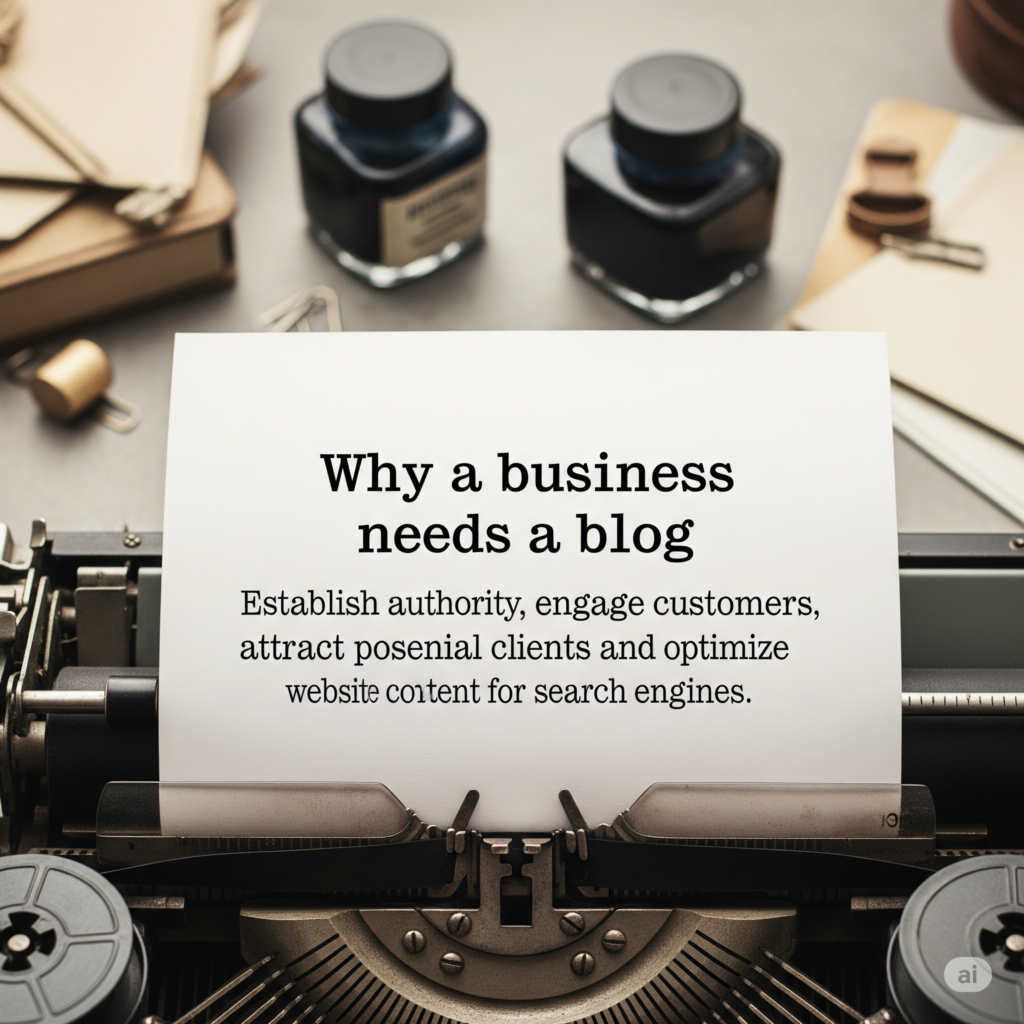
Hey there, business owners and marketing enthusiasts! Let’s be honest, you might have heard it before, maybe even thought it yourself: “Nobody reads blogs anymore, right?” It’s a common misconception, but guess what? It couldn’t be further from the truth! In fact, around 60% of people still read blogs at least once a week.
Blogging isn’t just a trend from the past; it’s a powerful, ever-evolving marketing strategy that businesses of all sizes can — and should — make part of their plan. Think of it as a friendly handshake with your potential customers, offering them valuable insights and building trust, all while giving your online presence a massive boost.
So, if you’re wondering how this “old-school” content format can still pack a punch for your modern business, you’re in the right place! We’re about to dive into why blogs are more important than ever, especially for getting noticed online.
What Exactly Is a Blog, Anyway? (And How is it Different from a Website?)
Before we dig into the “why,” let’s quickly clear up what we’re talking about.
At its core, a blog is a type of website where people (or businesses!) share information, thoughts, or stories in the form of written posts. These posts are typically organized in reverse chronological order, meaning the newest stuff is always right at the top. It’s a digital space designed for sharing expertise, offering insights, or just expressing ideas.
And blogging? That’s simply the act of creating and publishing all that fantastic content on your blog.
Now, you might be thinking, “Isn’t that just… a website?” Not quite! While a blog can certainly be part of your main business website (and often should be!), they have different primary purposes.
- A traditional website usually offers static pages that give insights about your products, services, or company, acting more as a navigation tool. Updates are less frequent and often subtle.
- A blog, on the other hand, is dynamic and constantly updated with fresh content. It’s also typically more interactive, inviting readers to comment, share, and engage directly with your posts.
So, while your website is your digital storefront, your blog is like your company’s vibrant, informative magazine, keeping readers engaged and coming back for more!
8 Big Reasons Why Blogs Are Still Golden for Your Business
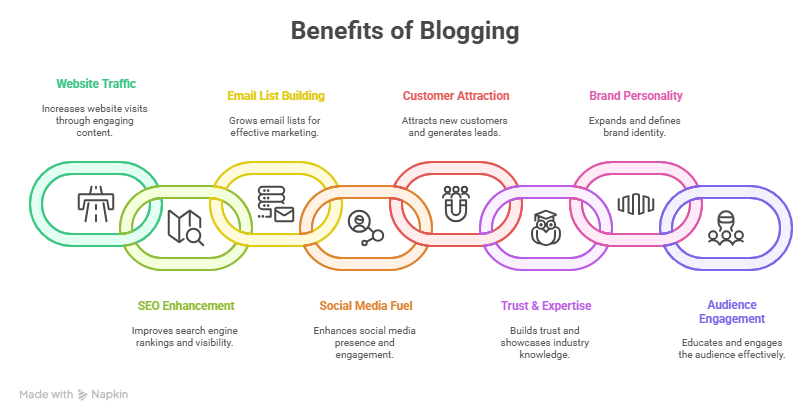
Okay, let’s get to the good stuff. Why should your business dedicate time and resources to blogging in today’s fast-paced digital world? Here are eight compelling reasons:
1. Drive Loads of Website Traffic
Imagine your website as a physical store. The more people who walk by, the more potential customers you have, right? Blogs do that for your website online! By creating relevant, fresh content, you give people more reasons to visit your site. In fact, businesses with blogs get a whopping 55% more website visitors than those without one.
Every new blog post is like putting out a fresh sign on your digital storefront. Plus, these posts become the perfect foundation for your social media content, giving you something valuable to share and encouraging clicks straight back to your website.
2. Supercharge Your Search Engine Optimization (SEO)
This is a big one! SEO is all about helping search engines (like Google) understand what your website is about so they can show it to people who are searching for related topics. Blogs are an SEO powerhouse:
- New Content & Indexed Pages: Google loves new content and prioritizes it. Every blog post creates a new indexed page on your site, which means more opportunities for you to show up in search results.
- Keyword Power: Blogs let you naturally broaden the keywords you use. By blogging about your industry, products, and customer questions, you’ll naturally incorporate terms people are searching for, helping your business appear higher in search engine result pages. Just remember, quality over quantity – avoid “keyword stuffing” or Google might penalize you.
- Long-Tail Keywords: This is where blogs really shine, especially if you’re a smaller player in a competitive market. While your core website pages cover broad topics (like “SEO services”), blogs allow you to target “long-tail keywords.” These are more specific search phrases (like “how does blogging help SEO for small businesses?”) that often have lower search volume but indicate a user who is highly relevant and likely needs your product or service soon.
- Improved Site Structure & Internal Linking: Blogs provide ample opportunities to link internally to other pages on your site, which helps search engines “crawl” and understand your website’s structure more easily.
- Backlink Opportunities: When your blog consistently provides valuable content, other websites will naturally want to link back to it. These “backlinks” are like votes of confidence from other sites, telling search engines that your content is a good resource and boosting your credibility and rankings.
3. Build Your Email List Like a Pro
Want to directly engage with potential customers? An email list is a fantastic tool for that. Blogs help introduce potential customers to your brand and familiarize them with what you offer, paving the way for more people to subscribe to your email list. People are also more likely to trust and sign up for your newsletters if they enjoy your blog content.
4. Fuel Your Social Media Game
Creating content for social media can feel like a never-ending task, right? Here’s a secret: your blog posts are already done! Once you’ve published a great blog post, there’s no need to rewrite it for social media. Simply share a link to your blog post on platforms like Facebook, LinkedIn, or X (formerly Twitter) and encourage your audience to click through, like, and share. It’s efficient content marketing at its best!
5. Attract New Customers & Generate Leads
Every blog post you publish creates another indexed page, which helps with SEO and gives new avenues for customers to find you. What’s even better? A well-written blog post can appear in Google searches for years, continuously providing new leads.
Remember to include clear Calls to Action (CTAs) on each page. Think “Call us for a free estimate,” “Book a consultation,” or “Download our free guide”. Make it easy for interested readers to take the next step and become your next customer!
6. Build Trust & Show Your Expertise
Your blog is a fantastic platform to share your value and expertise with the world. By consistently providing helpful, informative content, you show current and potential customers what your business is truly capable of. This helps establish your company as a leader and knowledgeable authority within your industry.
Whether it’s a “how-to” guide, a list of tips, or answers to common customer questions, blogs can significantly increase your audience’s trust and help retain existing customers through education.
7. Expand Your Brand’s Personality
Let’s face it, businesses can sometimes appear a bit… impersonal. A blog offers a wonderful opportunity to show the personal, human side of your business. It allows your audience to understand your company’s day-to-day operations, your values, and the people behind the products or services.
Did you know that 60% of consumers enjoy reading content from brands, and 82% feel more positive about a brand after reading their content? Your blog is the perfect place to let your brand’s unique voice and personality shine through!
8. Educate & Engage Your Audience
Consumers love to be informed. Your blog can be a valuable resource, showing how your business is the perfect solution to their problems. Readers can explore your content from the comfort of their homes, learning about your business even if they hadn’t considered it before.
Remember, your blog doesn’t always have to be about your business directly. Focus on building trust by being a source of reliable information. And if readers leave comments or ask questions, interact with them! Responding publicly builds community and allows future readers to see those valuable interactions.
Blogging Best Practices: Make Your Posts Shine!
So, you’re convinced blogging is awesome. But how do you make sure your posts are effective? It’s not enough to just write; you need to optimize!
- Quality First, Always: Your content needs to be authentic, plagiarism-free, impactful, and trustworthy. Keep it simple and easy to understand – no overly complex language, please!
- Smart Keyword Use: Do your homework and research your keywords. Then, strategically place your main keyword in your blog title and meta description. Use other important keywords in your subtitles and sprinkle them naturally throughout the content. Just avoid that “keyword stuffing” we talked about!
- Structure for Readability: This is crucial for both readers and search engines! Start with a clear, attention-grabbing title. Your introduction should hook the reader and set expectations. Break up your main content (the “body”) with clear subheadings (H1, H2, H3), bullet points, examples, and images to make it easy to skim and digest. Always end with a strong conclusion summarizing key points, and a clear Call to Action (CTA).
- Link, Link, Link: Use internal links to connect your blog posts to other relevant pages on your website. This helps search engines understand your site better. Also, don’t shy away from external links to trusted sources; it adds credibility to your points.
- Mobile-Friendly & Fast: Most people browse on their phones, so make sure your posts are easy to read and scroll through on all devices. Optimize images so your pages load quickly – it’s a big ranking factor for search engines!
- Consistency is Key: Google (and your readers!) love a steady stream of fresh content. Stick to a regular posting schedule, whether it’s once a day or 2-4 times a month.
- Promote Your Hard Work: Don’t just hit publish and hope for the best! Share your blog links across your social media platforms, in email newsletters, and consider inviting guest bloggers or collaborating with other businesses.
- Engage with Your Readers: If someone takes the time to comment or ask a question, respond! It builds a loyal community and shows you value your audience.
Ready to Start Your Own Blog Journey? (Quick Steps to Get Rolling!)
Feeling inspired? Here’s a quick roadmap to help you kickstart your own business blog:
- Define Your Target Audience: Who are you trying to reach? What problems can you solve for them?
- Brainstorm Content Ideas: What topics are relevant to your audience and niche? Keep it fresh and unique!
- Choose a Content Management System (CMS): This is the software that helps you design and publish your blog. WordPress is a popular and easy-to-use choice.
- Develop a Solid Content Strategy: What kind of content will you create? How often will you post? Where will you promote it?
- Write Engaging & Well-Structured Posts: Remember all those best practices we just covered – compelling titles, clear subheadings, visuals, and a strong CTA!
- Actively Promote Your Content: Share it on social media, in your email newsletters, and consider inviting guests or linking to other sites.
- Continuously Optimize for SEO: Research keywords, focus on internal/external linking, and ensure your blog is user-friendly.
- Experiment with Different Blog Styles: Try “how-to” guides, listicles, multimedia posts, interviews, or even personal stories to keep things interesting.
- Repurpose Old Content: Don’t let good content go to waste! Turn a video into an article, or update an old post to give it new life.
- Keep an Eye on Competitors: See what’s working for them, identify trends, and find opportunities to stand out!
Conclusion
So, despite what some might say, blogs are anything but obsolete. In today’s hyper-digital world, they are an essential tool for building your online presence, attracting new audiences, and fostering genuine connections with your customers.
By consistently sharing valuable insights, you not only establish your business as an industry authority but also significantly improve your search engine visibility, drive organic traffic, and ultimately, generate leads and income.
Don’t let your business be invisible to millions of potential customers. Embrace blogging as a vital, dynamic medium to communicate, connect, and grow!
Ready to Elevate Your Online Presence?
What are your thoughts on blogging for business? Have you seen great results, or are you just getting started? Share your comments below – we’d love to hear from you!
And if you’re feeling overwhelmed by the thought of optimizing your blog for SEO, or need a hand with your content strategy, don’t hesitate to reach out! We’re here to help you attract valuable traffic and get your business to the next level.
Local SEO Secrets: Get Your Business Found in Your City
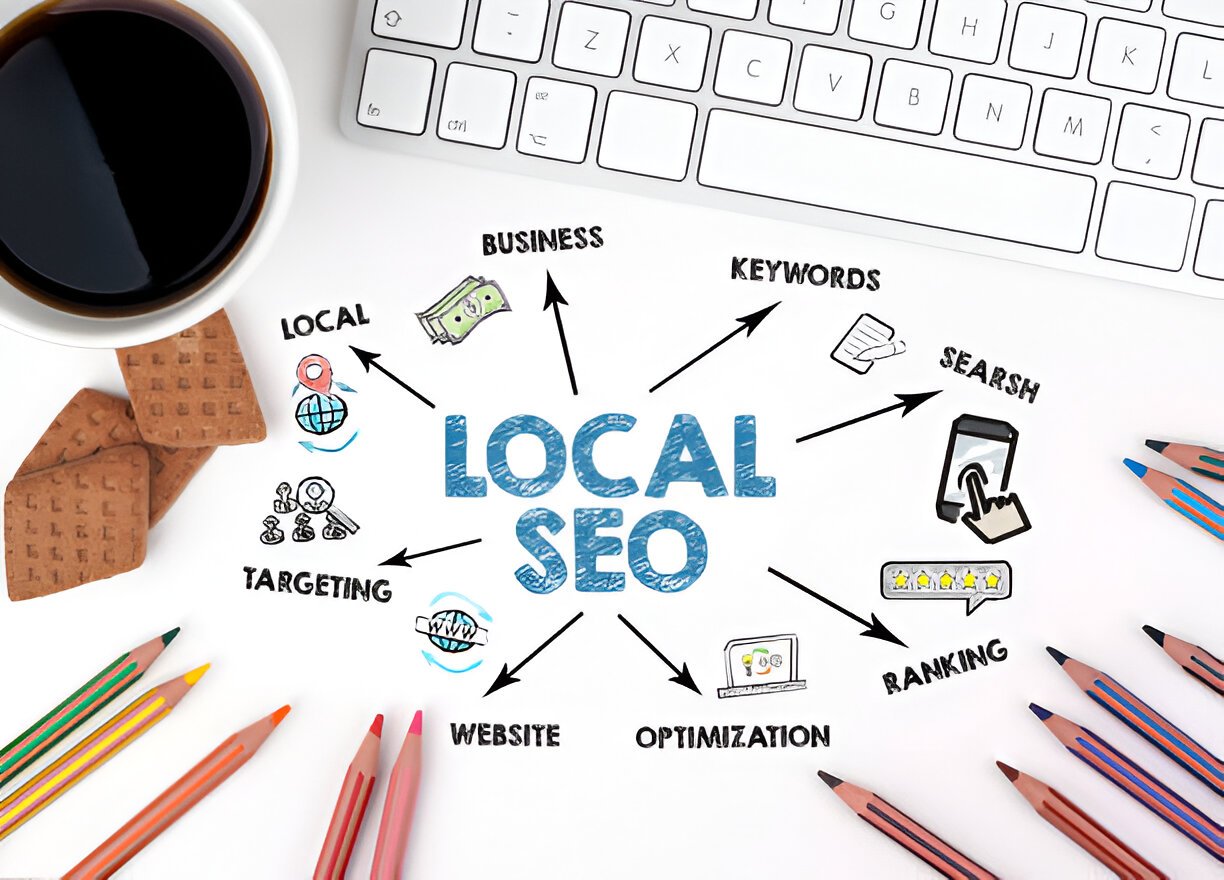
In today’s digital-first world, if your local customers can’t find your business online, you’re leaving serious money on the table. Local SEO (Search Engine Optimization) helps businesses like yours show up in the right place — when nearby customers are searching for products or services you offer.
As a digital marketing agency in Navi Mumbai, we at RankUpar have helped dozens of businesses improve their visibility, get more calls, and drive foot traffic using proven local SEO strategies. In this guide, we’ll share actionable tips to help your business get found in your city — no jargon, just real, practical steps.
🌟 What Is Local SEO (And Why Should You Care)?
Local SEO is all about helping your business appear in local search results — think of searches like:
✅ “plumber near me”
✅ “best bakery in Navi Mumbai”
✅ “digital marketing agency in Navi Mumbai”
When people make these kinds of searches, Google shows a local pack (that map with three business listings) and local organic results. Getting your business featured there means more leads, more visits, and more customers.
👉 Fact: 76% of people who search for something nearby on their smartphone visit a business within 24 hours.
🚀 Why Local SEO Is Essential for Businesses in Navi Mumbai
Navi Mumbai is a growing hub — whether you run a shop in Vashi, a clinic in Nerul, or a digital marketing agency in Navi Mumbai, your customers are online. Local SEO puts you on their radar exactly when they’re ready to act.
Here’s what local SEO can help you achieve:
- 📈 Higher visibility in Google’s local pack
- ☎️ More calls, visits, and inquiries
- 💬 Better reputation through reviews
- 🏆 Stay ahead of local competitors
✅ Local SEO Secrets to Rank High in Your City
Let’s break down the top strategies we use as a digital marketing agency in Navi Mumbai to help clients dominate local search.
1️⃣ Claim and Optimize Your Google My Business (GMB) Profile
Google My Business (now called Google Business Profile) is your online storefront.
👉 Make sure you:
- Claim and verify your business
- Use your exact business name — no keyword stuffing
- Add accurate address and phone number (match your website)
- Select the right business categories (primary + secondary)
- Write a keyword-rich description (mention digital marketing agency in Navi Mumbai if that’s your niche)
- Upload high-quality photos of your office, team, products
👉 Tip: Update your profile regularly with posts, offers, and events to stay active in Google’s eyes.
2️⃣ Get Local Citations and Directory Listings
Citations = mentions of your business name, address, and phone (NAP) on other sites.
👉 Build citations on:
- JustDial
- Sulekha
- IndiaMART
- Yellow Pages
- Local business directories for Navi Mumbai
👉 Ensure consistency: Your NAP must exactly match everywhere (no spelling variations, no outdated phone numbers).
3️⃣ Encourage Customer Reviews
Reviews are a massive local SEO ranking factor.
👉 Ask happy clients to leave 5-star reviews on Google — it builds trust and improves rankings.
👉 Respond to reviews politely — even negative ones. Show that you care about customer service.
👉 Example review request template:
“Hi [Name], thank you for choosing RankUpar as your digital marketing agency in Navi Mumbai! Would you mind sharing your experience on Google? It helps us and other customers.”
4️⃣ Optimize Your Website for Local Keywords
👉 Sprinkle local keywords naturally across your site, like:
- digital marketing agency in Navi Mumbai
- SEO services Navi Mumbai
- social media marketing Navi Mumbai
- best digital marketing company in Navi Mumbai
👉 Add location pages if you serve multiple areas (Vashi, Nerul, Belapur, etc.)
👉 Embed Google Maps on your contact page.
👉 Use schema markup (local business schema) — this helps search engines understand your location.
5️⃣ Create Local Content That Helps Your Audience
👉 Blog ideas for local SEO:
- “How Small Businesses in Navi Mumbai Can Succeed Online”
- “Best Practices for Running Facebook Ads in Navi Mumbai”
- “Local SEO Checklist for Startups in Navi Mumbai”
👉 Write case studies showcasing your work with Navi Mumbai clients.
👉 Share local news, events, or partnerships on your blog.
6️⃣ Mobile-Friendly + Fast Website = Higher Local Ranking
👉 Most local searches happen on mobile.
👉 Ensure your website loads fast, looks good on mobile, and has click-to-call buttons.
Ask RankUpar (your trusted digital marketing agency in Navi Mumbai) — we can audit and fix your site speed + mobile usability.
7️⃣ Leverage Social Media for Local Presence
👉 Stay active on Facebook, Instagram, LinkedIn — mention your location.
👉 Use local hashtags: #navimumbai #vashi #nerulbusiness
👉 Join local groups and communities.
Social signals indirectly help your local SEO.
8️⃣ Monitor and Improve Your Performance
👉 Use Google Search Console and Google Business Profile Insights to track how many people find you.
👉 Watch out for:
- What search terms people use
- How many calls/direction requests you get
- Which photos get the most views
👉 Adjust your strategy based on data!
💡 Why Work With a Local SEO Expert Like RankUpar?
Many businesses try DIY local SEO but struggle to stay consistent. That’s where a digital marketing agency in https://rankupar.com/seo-services-in-mumbai/Navi Mumbai like RankUpar adds value:
✅ We handle setup + optimization + ongoing strategy.
✅ We help you outrank competitors using ethical SEO techniques.
✅ We save your time so you can focus on running your business.
🌟 Final Thoughts
Local SEO isn’t a one-time task — it’s an ongoing effort that keeps your business visible, competitive, and successful.
If you’re serious about growing your customer base, RankUpar is ready to help. As a trusted digital marketing agency in Navi Mumbai, we know what it takes to get your business found in your city.
👉 Contact us today for a free local SEO audit and take the first step towards dominating local search!
How AI Can Be Used in Digital Marketing: A Game-Changer for Businesses in Mumbai and Beyond

Picture yourself as a small business owner in Mumbai, running a bustling café in Bandra or a trendy boutique in Colaba. You’re juggling a million tasks—managing inventory, delighting customers, and trying to make your brand stand out in a city that never sleeps. Digital marketing is your ticket to reaching more customers, but the thought of crafting SEO strategies, running Google Ads, or posting viral Instagram reels feels like climbing Marine Drive during rush hour. This is where Artificial Intelligence (AI) steps in, acting like a trusty partner to simplify, optimize, and supercharge your marketing efforts. As a digital marketing agency in Mumbai, we’ve seen AI transform businesses, from startups in Andheri to established brands in Worli. In this blog, we’ll explore how AI is revolutionizing digital marketing, with practical tips, Mumbai-specific examples, and insights to help your business thrive.
Why AI is a Must-Have for Digital Marketing in Mumbai
Mumbai’s digital landscape is as vibrant and competitive as its streets. With millions of users searching for “best SEO agency in Mumbai” or “local SEO services Mumbai” every day, businesses need to be smarter, faster, and more strategic to stand out. AI isn’t just a buzzword—it’s a powerful tool that analyzes data, predicts trends, and automates tasks, letting you focus on what you do best: running your business. Whether you’re a website developer in Mumbai crafting a WordPress site or a Google Ads agency in Mumbai optimizing campaigns, AI can elevate your results. Let’s dive into the ways AI is reshaping digital marketing, with real-world applications for Mumbai’s dynamic market.
1. AI-Powered SEO: Dominating Mumbai’s Search Results
Search Engine Optimization (SEO) is the foundation of online visibility, and as the best SEO agency in Mumbai, we know ranking on Google’s first page is a game-changer. AI takes SEO to new heights by making it more precise and efficient.
How AI Enhances SEO
- Keyword Research: AI tools like SEMrush analyze search trends to uncover high-traffic, low-competition keywords. For a Mumbai café, AI might suggest targeting “local SEO servichttps://rankupar.com/seo-services-in-mumbai/es Mumbai” or “best coffee shops in Bandra” to attract nearby customers.
- Content Optimization: Platforms like SurferSEO use AI to analyze top-ranking pages and provide real-time suggestions, ensuring your blog on “Mumbai’s Best Cafés” outranks competitors.
- Voice Search: With Mumbaikars increasingly using voice assistants, AI optimizes content for conversational queries like “best SEO agency in Mumbai near me.”
- Predictive Analytics: AI forecasts trending keywords, such as “Diwali offers in Mumbai,” helping you stay ahead of seasonal demand.
Mumbai Example
A Juhu-based bakery partnered with our digital marketing agency in Mumbai to boost its online presence. Using AI-driven tools, we identified keywords like “fresh cakes in Mumbai” and optimized their website. Within four months, their organic traffic soared by 45%, and they ranked #1 for local searches, driving more foot traffic to their store.
2. AI in Website Development: Building Smarter, User-Friendly Sites
Your website is your digital storefront, and as expert website developers in Mumbai, we know first impressions matter. AI enhances WordPress website development in Mumbai by creating sites that are visually stunning, fast, and tailored to your audience.
How AI Powers Website Development
- AI-Driven Design: Tools like Wix ADI generate responsive layouts in minutes, ideal for Mumbai startups on a budget.
- Personalization: AI analyzes visitor behavior to display relevant content, like monsoon gear for Mumbai shoppers or festive offers during Ganesh Chaturthi.
- Chatbots: AI-powered chatbots engage visitors 24/7, answering queries like “Do you offer WordPress website development in Mumbai?” or guiding users through your services.
- Performance Optimization: AI tools like WP Rocket ensure your site loads faster than a Mumbai local train, improving user experience and SEO.
Mumbai Example
A Thane-based e-commerce startup approached us for WordPress website development in Mumbai. Using AI, we built a site with personalized product recommendations and a chatbot that answered customer queries instantly. The result? A 30% increase in user engagement and a 20% boost in sales within three months. Curious about building your own site? Check out our web development services at rankupar.com.
3. AI in Social Media Marketing: Connecting with Mumbai’s Audience
Mumbai’s social media scene is electric—think Instagram reels of Vada Pav stalls or LinkedIn posts about startup success. As a social media marketing company in Mumbai, we use AI to create campaigns that resonate with this vibrant audience.
How AI Boosts Social Media
- Content Scheduling: AI tools like Buffer analyze engagement data to post when your audience is most active, like 8 PM when Mumbaikars unwind.
- Targeted Ads: Meta Ads’ AI targets specific demographics, such as young professionals in Lower Parel or families in Borivali, ensuring your ads hit the mark.
- Content Creation: Tools like Canva’s Magic Studio generate stunning visuals, while AI platforms like Lately craft captions tailored for Mumbai’s diverse audience.
- Sentiment Analysis: AI monitors comments to gauge sentiment, helping you respond to feedback—like addressing a customer’s query about delivery delays.
Mumbai Example
A South Mumbai restaurant hired our social media marketing company in Mumbai to boost its Instagram presence. Using AI, we scheduled reels showcasing their coastal cuisine and targeted ads to foodies in Colaba. The campaign led to a 35% increase in followers and a 25% uptick in reservations.
4. AI in Google Ads and PPC: Maximizing ROI in Mumbai’s Market
Pay-per-click (PPC) advertising is a powerful way to drive traffic, but without strategy, it’s like burning cash in a Mumbai monsoon. As a Google Ads agency in Mumbai, we use AI to make PPC services in Mumbai cost-efficient and effective.
How AI Enhances PPC
- Smart Bidding: Google Ads’ AI-driven Smart Bidding (e.g., Target CPA) adjusts bids in real-time to maximize clicks within your budget.
- Ad Copy Generation: AI tools like Copy.ai create compelling ads, such as “Grow with the Best SEO Agency in Mumbai!” tailored for local audiences.
- Audience Segmentation: AI targets specific groups, like Mumbai entrepreneurs searching for “PPC services in Mumbai.”
- Fraud Detection: AI identifies click fraud, ensuring your budget isn’t wasted.
Mumbai Example
A Mumbai-based real estate firm worked with our Google Ads agency in Mumbai to promote luxury flats. AI-driven Smart Bidding and geo-targeted ads reduced their cost-per-click by 20% and increased leads by 40% in one quarter. Want to learn more about PPC? Check out Google’s guide to Smart Bidding.
5. AI in Content Marketing: Crafting Stories That Resonate
Content is the heart of digital marketing, and in a city as diverse as Mumbai, storytelling is key. As a content marketing agency in Mumbai, we use AI to create content that engages and converts.
How AI Boosts Content Marketing
- Content Creation: AI tools like Jasper generate blog drafts, email newsletters, and social posts, saving time while maintaining quality.
- Personalization: AI delivers tailored content, like blog posts on “Mumbai’s Best Monsoon Getaways” for local readers.
- SEO Optimization: Tools like Clearscope ensure your content ranks for keywords like “content marketing agency in Mumbai.”
- Performance Tracking: AI analyzes engagement metrics to refine strategies, ensuring your content resonates with Mumbai’s audience.
Mumbai Example
A Mumbai travel agency partnered with our content marketing agency in Mumbai to create a blog series on “Hidden Gems in Maharashtra.” AI-generated drafts and SEO optimization led to a 50% increase in blog traffic and a 20% boost in bookings.
6. AI in Local SEO: Winning Mumbai’s “Near Me” Searches
For businesses targeting Mumbai’s local market, local Shttps://rankupar.com/seo-services-in-mumbai/ EO services in Mumbai are essential. AI helps you connect with customers searching for “near me” services.
How AI Enhances Local SEO
- Google My Business Optimization: AI tools like BrightLocal optimize your GMB profile with keywords like “best SEO agency in Mumbai.”
- Review Management: AI monitors and responds to reviews, building trust with Mumbai’s community.
- Geo-Targeted Content: AI creates content for specific neighborhoods, like “Best Salons in Juhu.”
- Voice Search: AI optimizes for voice queries like “local SEO services Mumbai” to capture mobile users.
Mumbai Example
A Borivali gym used our local SEO services in Mumbai to rank for “gyms near me.” AI-optimized GMB profiles and location-specific content drove a 50% increase in walk-in clients within six months. For more on local SEO, explore Moz’s Local SEO Guide.
7. AI for Data-Driven Decisions: Smarter Strategies for Mumbai
AI’s true power lies in its ability to turn data into actionable insights. For a digital marketing agency in Mumbai, this means making informed decisions that drive results.
How AI Helps with Data
- Customer Insights: AI tools like HubSpot analyze behavior to identify what Mumbai shoppers want, from festive discounts to eco-friendly products.
- Campaign Performance: AI tracks metrics like click-through rates, helping you tweak campaigns for better results.
- Predictive Analytics: AI forecasts trends, like which products will trend in Mumbai during Diwali, so you can plan campaigns proactively.
Mumbai Example
A Mumbai e-commerce brand used AI analytics to discover that video content outperformed static ads. Shifting their budget to video ads led to a 35% increase in sales during the festive season.
Challenges and Considerations
AI is a game-changer, but it’s not perfect. Over-reliance can make content feel robotic, so we always add a human touch at our digital marketing agency in Mumbai. Data privacy is a concern, especially with Mumbai’s tech-savvy audience demanding transparency. AI tools can also be costly, but the ROI often outweighs the investment for businesses serious about growth.
Tips for Getting Started with AI in Digital Marketing
- Start Small: Use free AI tools like Google Analytics to understand your audience.
- Choose the Right Tools: Invest in platforms like SEMrush or Buffer for specific needs like SEO or social media.
- Balance AI and Human Creativity: Use AI for data and drafts, but add your brand’s unique voice.
- Monitor Results: Track metrics to ensure AI strategies deliver ROI.
- Partner with Experts: Work with a digital marketing agency in Mumbai like ours to maximize AI’s potential.
Conclusion: Embrace AI to Thrive in Mumbai’s Digital Landscape
AI is transforming digital marketing, making it easier for Mumbai businesses to connect with their audience, optimize campaigns, and drive growth. From local SEO services in Mumbai to PPC services in Mumbai, AI empowers businesses to work smarter, not harder. As a dihttps://rankupar.com/gital marketing agency in Mumbai, we’re passionate about helping brands leverage AI to stand out in this vibrant city. Ready to take your marketing to the next level? Contact us at rankupar.com to explore how AI can transform your business.
The Hidden Costs of Cheap Digital Marketing: A Reality Check from a Trusted Digital Marketing Agency in Mumbai

Every business dreams of skyrocketing their online presence without breaking the bank. Cheap digital marketing services often promise just that—more traffic, better rankings, and a flood of leads, all for a fraction of the cost. It sounds like a steal, right?
But as tempting as these budget-friendly offers are, they often hide a darker side. At Rankupar, a results-driven digital marketing agency in Mumbai, we’ve seen firsthand how low-cost marketing solutions can backfire, costing businesses far more than they save. Let’s dive into the hidden costs of cheap digital marketing and why investing in quality is the smarter move.
The Allure of Budget Digital Marketing
It’s easy to see why cheap digital marketing services are so appealing. For small businesses, startups, or entrepreneurs just starting out, every rupee counts. These services dangle promises of instant results—higher Google rankings, viral social media posts, or a flashy website—all at prices that seem too good to pass up.
But here’s the catch: cutting corners in digital marketing rarely delivers the results you expect. Instead, it often leads to frustration, wasted budgets, and missed opportunities—especially when you’re not working with a reliable digital marketing agency in Mumbai that understands your local market.
5 Hidden Costs You Can’t Ignore
Opting for bargain-basement digital marketing might save you money upfront, but the long-term consequences can hit your business hard. Here are five hidden costs to watch out for:
1. Shoddy Content That Hurts Your Brand
Great content builds trust, engages visitors, and boosts your SEO. Cheap services, however, often churn out low-quality content—think generic blog posts, poorly written social media captions, or keyword-stuffed pages that feel robotic. This kind of content doesn’t just fail to connect with your audience; it can actively turn them away.
Worse, Google’s algorithms are smarter than ever, and they penalize low-value content, pushing your site further down the search results.
2. Risky SEO Shortcuts
Some budget providers resort to shady SEO tactics to fake quick wins. Tactics like buying low-quality backlinks, stuffing keywords, or using hidden text might give you a temporary ranking boost, but they’re a ticking time bomb. Search engines like Google crack down hard on these black-hat practices, and getting caught can tank your rankings or even get your site banned.
Fixing the damage requires time, know-how, and expensive clean-up efforts that could cost more than the original service. That’s why working with a trusted SEO agency in Mumbai like Rankupar is crucial for long-term success.
3. One-Size-Fits-All Strategies
Every business is unique, but cheap digital marketing services often rely on cookie-cutter templates. Whether it’s a generic social media plan or an SEO strategy that ignores your niche, these one-size-fits-all approaches rarely work.
Without a tailored plan, you’re wasting money on campaigns that miss the mark, targeting the wrong audience or using irrelevant keywords. A personalized strategy from a professional digital marketing agency in Mumbai ensures your efforts align with your specific goals.
4. Unreliable Results and Missed Opportunities
Low-cost providers often lack the expertise to deliver consistent, measurable results. You might see a spike in clicks or likes, but these vanity metrics don’t always translate to real business growth.
Without a focus on long-term strategies like content marketing, local SEO, or conversion optimization, your campaigns may fizzle out quickly—leaving you with little to show for your investment.
5. Draining Your Time and Energy
Managing a cheap marketing campaign often means dealing with constant issues—missed deadlines, ineffective ads, or poor communication from the provider. You’ll spend hours micromanaging or troubleshooting, pulling your focus away from running your business.
In the end, you may need to hire a professional team to undo the mess, doubling your costs and stress.
Why Quality Digital Marketing Pays Off
Investing in professional digital marketing services might cost more upfront, but the benefits far outweigh the price tag. Here’s why:
- Proven Expertise: Experienced agencies like Rankupar bring industry knowledge and cutting-edge strategies to the table, ensuring your campaigns are built to succeed.
- Tailored Solutions: Quality services are customized to your business, targeting the right audience with the right message at the right time.
- Sustainable Growth: Professional strategies focus on long-term success, driving consistent traffic, leads, and sales over time.
- Clear Insights: Reputable agencies provide detailed analytics and reports, so you always know how your investment is performing.
Choosing the Right Digital Marketing Partner
To steer clear of the traps of cheap services, here’s how to pick a trustworthy agency:
- Look for Proven Success: Check for client success stories, case studies, or reviews that show real results in your industry.
- Understand Their Approach: A good agency will explain their strategy clearly and align it with your business goals.
- Demand Transparency: Choose a partner that offers regular updates and detailed performance reports.
- Focus on Value: Don’t just chase the lowest price—prioritize an agency that delivers measurable ROI.
Final Thoughts
Cheap digital marketing services might seem like a quick fix, but their hidden costs—shoddy content, risky SEO, generic strategies, unreliable results, and wasted time—can sabotage your business.
Investing in a digital marketing agency in Mumbai like Rankupar is an investment in your brand’s future. We specialize in customized, results-driven strategies that help your business thrive online.
Ready to ditch the shortcuts and build a winning digital presence?
📞 Get in touch with Rankupar today!
Are SEO and SEM the Same? Key Differences & How to Use Them for Business Growth

Many businesses ask the important question: Are SEO and SEM the same? While both aim to improve your website's visibility on search engines, they use different strategies. This blog will clarify the difference between SEO services and SEM services, how they work individually and together, and how tools like social media play a role in boosting your online presence.
What is SEO? (Search Engine Optimization)
SEOor Search Engine Optimization is a technique that improves your website’s rankings in search engine results without paid ads. It focuses on optimizing content, website structure, and backlinks to increase organic traffic.
Key Components of SEO Services
1. On-Page SEO
- Optimizing title tags, meta descriptions, headers, images, and keyword usage.
- Example: Including your focus keyphrase like “are SEO and SEM the same” naturally in your blog.
2.Technical SEO
- Fixing site speed, mobile responsiveness, structured data, URL structures, and more.
3. Off-Page SEO
- Building backlinks, social shares, brand mentions, and citations.
4.Content SEO
- Publishing high-quality, keyword-optimized blog posts, guides, and landing pages.
Why SEO Services Matter
Professional SEO services use tools like SEMrush, Ahrefs, and Google Search Console to analyze competition, track ranking, and implement best practices tailored to your niche.
What is SEM?
SEM (Search Engine Marketing) involves paid advertising, commonly using Google Ads (formerly Google AdWords) to appear on the top or bottom of the search engine results pages (SERPs).
Types of SEM Services
- PPC (Pay-Per-Click) Campaigns
You only pay when a user clicks on your ad. - Display Advertising
Visual banner ads shown across websites in Google’s Display Network. - Shopping Ads
Ideal for e-commerce sites promoting specific products. - Remarketing
Re-targeting users who previously visited your website.
Why Use SEM?
SEM services offer quick visibility and are useful for new websites or product launches. With SEM, you can run targeted campaigns based on demographics, location, device, and even search intent.
Are SEO and SEM the Same?
No, SEO and SEM are not the same. Although they both aim to drive traffic from search engines, the methods, costs, timelines, and strategies are very different.
Key Differences Between SEO and SEM
| Feature | SEO | SEM |
|---|---|---|
| Traffic Type | Organic | Paid |
| Cost | Time/effort investment | Pay-per-click |
| Results | Long-term and sustainable | Immediate but temporary |
| Position | Below ads in SERPs | Top of SERPs |
| Strategy | Content, optimization, backlinks | Keyword bidding, ad creatives |
| Best For | Trust-building, long-term growth | Quick leads, promotions |
When to Use SEO vs. SEM
Use SEO when:
- You have time to grow organically.
- You want to build long-term credibility.
- You’re working with a tight ad budget.
- You aim to build authority with content.
Use SEM when:
- You need fast results.
- You’re launching a new product or offer.
- You want high visibility for a short period.
- You’re targeting specific customer personas.
Combining SEO and SEM for Maximum Impact
The best marketing campaigns don’t rely on just one method. SEO and SEM can work together to create a powerful online presence.
Benefits of Combining SEO and SEM
- Double the visibility on Google’s SERPs.
- Use SEM data (clicks, CTRs) to improve SEO keyword strategies.
- Test ad copy for future organic content.
- Target different stages of the sales funnel.
How Social Media Supports SEO and SEM
Social media isn’t a direct SEO ranking factor, but it can indirectly improve SEO and SEM performance by:
- Distributing content (blogs, videos, landing pages).
- Increasing engagement and shares.
- Driving traffic to key pages.
- Enhancing brand awareness (which helps click-through rates).
- Supporting paid SEM ads with social proof.
Example: A viral post on Instagram or Facebook linking to a landing page can boost organic search visibility and increase conversions from SEM ads.
Real-World Example
A digital marketing agency offering both SEO services and SEM services launched a campaign for a local bakery:
- Ran Google Ads to bring instant traffic (SEM).
- Simultaneously optimized the bakery’s website and blog content for keywords like “best cakes in Mumbai” (SEO).
- Promoted blog posts and offers on social media to generate backlinks and shares.
- Result: Organic traffic increased by 85% in 3 months, and paid ads delivered 3x ROI.
Pros and Cons of SEO and SEM
Pros of SEO
- Cost-effective long-term.
- Builds brand authority.
- Higher click-through rates than ads.
- Ideal for evergreen content.
Cons of SEO
Time-consuming.
- Constant algorithm updates.
- Requires technical expertise.
Pros of SEM
- Fast results.
- Full control over budget and targeting.
- Great for A/B testing.
Cons of SEM
- Can be expensive over time.
- Traffic drops when budget ends.
- Requires constant monitoring.
SEO vs. SEM for Small Businesses
If you’re a startup or small business with a limited budget, consider:
- Start with SEM to generate initial leads.
- Invest in SEO services for long-term visibility.
- Use social media to promote both efforts affordably.
FAQs: Are SEO and SEM the Same?
Q1. Can SEO and SEM be used together?
Absolutely. They complement each other and help maximize visibility.
Q2. Which is better: SEO or SEM?
It depends on your goals. SEO is long-term, SEM is short-term and immediate.
Q3. Does social media affect SEO or SEM?
Indirectly, yes. Social signals boost visibility, content sharing, and brand reputation.
Q4. Are PPC and SEM the same?
PPC is a part of SEM. All PPC is SEM, but SEM includes other paid tactics too.
Final Thoughts
So, to wrap it up—are SEO and SEM the same? No, but they work beautifully together when executed with a strategy. Whether you’re building authority with SEO services or driving quick conversions with SEM services, the end goal is the same: more visibility, more traffic, and more growth.
When combined with a strong social media marketing presence, your brand can truly dominate the digital landscape.
If you’re looking to elevate your business’s online presence through strategic SEO and SEM approaches, it’s essential to choose the right digital marketing partner. At Rankupar Digital Marketing Services, we specialize in delivering tailored solutions that drive traffic, leads, and conversions. Whether you’re aiming to boost organic visibility through SEO or achieve fast results via SEM, our expert team can guide you through every step. For additional insights and updates, you can also refer to Google’s official guide on SEO and SEM, which breaks down how both practices can work together effectively.
AI in Digital Marketing: Boost SEO, Ads & Customer Engagement

How AI Can Be Used for Digital Marketing
In the ever-evolving digital landscape, Artificial Intelligence (AI) is revolutionizing the way businesses market their products and services. From automating repetitive tasks to delivering personalized customer experiences, AI is shaping the future of digital marketing. If you’re searching for SEO services in Mumbai, website development services, or the best digital marketing agency in Thane, AI-driven strategies can give your business a competitive edge. Let’s explore how AI is transforming SEO, PPC, Meta Ads, content marketing, and other digital marketing strategies.
1. AI in SEO: Smarter Optimization for Better Rankings
Search Engine Optimization (SEO) is essential for online visibility, and AI is making it smarter. With AI-powered tools, businesses can improve rankings faster and more efficiently.
How AI Enhances SEO:
- Keyword Research & Optimization: AI tools analyze search trends and competition to suggest the best keywords, including long-tail variations.
- Content Optimization: AI can analyze top-ranking content and recommend improvements, ensuring your website ranks higher.
- Voice Search Optimization: AI helps businesses optimize for voice search queries, improving their chances of ranking in featured snippets.
- Technical SEO: AI detects website issues like broken links, slow loading speed, and crawl errors, ensuring better performance.
If you’re looking for SEO services in Mumbai, incorporating AI-driven strategies can skyrocket your search rankings.
2. AI in PPC & Meta Ads: Data-Driven Paid Advertising
Pay-per-click (PPC) advertising and Meta Ads (Facebook & Instagram Ads) require precision, and AI is making it easier to maximize ROI.
Add Your Heading Text Here:
- Automated Bidding: AI optimizes bids in real-time to maximize conversions.
- Ad Personalization: AI analyzes user behavior to deliver highly targeted ads.
- Performance Prediction: AI predicts which ads will perform best, allowing advertisers to refine their campaigns.
- Fraud Detection: AI helps detect and prevent ad fraud, ensuring a better return on ad spend.
If you’re looking for the best digital marketing agency in Thane, choose one that leverages AI-driven PPC and Meta Ads strategies for higher conversions.
3. AI in Content Marketing: Creating Engaging & Relevant Content
Content is king, and AI is the ultimate assistant for creating high-quality, relevant, and engaging content.
H3 AI-Powered Content Marketing Benefits:
- Content Generation: AI tools help brainstorm ideas and create drafts for blogs, social media, and more.
- Sentiment Analysis: AI gauges audience emotions and preferences, helping brands tailor content accordingly.
- Content Personalization: AI delivers the right content to the right audience, increasing engagement.
- Automated Content Distribution: AI schedules and posts content at optimal times for maximum reach.
A smart content marketing strategy, powered by AI, can take your brand visibility to the next level.
4. AI in Website Development: Smart & Interactive Websites
A strong website development strategy ensures a seamless user experience, and AI is enhancing websites with automation and personalization.
AI-Driven Website Development Features:
- Chatbots & Virtual Assistants: AI-powered chatbots engage users in real-time, improving customer experience.
- Website Personalization: AI delivers customized content based on visitor behavior.
- Predictive Analytics: AI anticipates user actions and recommends relevant products or services.
- Voice Search Optimization: AI ensures your website is optimized for voice searches.
For businesses looking for website development services, AI-driven websites offer a dynamic and user-friendly experience.
5. AI in Social Media Marketing: Automating & Enhancing Engagement
Social media is a critical marketing channel, and AI is optimizing it for better engagement and results.
AI in Social Media:
- Automated Scheduling: AI tools schedule posts at optimal times for maximum engagement.
- AI-Powered Analytics: AI tracks social media performance and provides actionable insights.
- Chatbots for Customer Support: AI-driven bots handle queries instantly, improving customer experience.
- Trend Analysis: AI identifies trending topics, helping brands create viral content.
AI-powered social media marketing strategies can help brands connect with their audience more effectively.
Conclusion: Future-Proof Your Digital Marketing with AI
AI is no longer the future; it’s the present. Whether you’re focusing on SEO, PPC, Meta Ads, content marketing, website development, or social media marketing, AI-driven strategies provide better efficiency, higher engagement, and greater ROI. If you’re looking for SEO services in Mumbai, the best digital marketing agency in Thane, or website development services, integrating AI into your marketing plan will give you a competitive edge.
At RankUpar, we specialize in AI-powered digital marketing solutions to help businesses grow online. Let’s leverage AI to boost your brand’s success!
👉 Contact us today to learn more!
How AI is Changing the World: Future of Digital Marketing

INTRODUCTION
Artificial Intelligence (AI) is revolutionizing industries across the globe, and digital marketing is no exception. From automating repetitive tasks to providing deep insights into consumer behavior, AI is reshaping the way businesses operate. For digital marketing agencies in Mumbai and across the world, AI has become an essential tool in delivering efficient and data-driven results. In this article, we explore how AI is transforming digital marketing and why businesses looking for SEO services in Mumbai, the best website developer in Mumbai, and the best PPC agency should embrace AI-driven solutions.
The Rise of AI in Digital Marketing
AI has disrupted traditional marketing by offering smarter, more precise, and automated strategies. With machine learning, natural language processing (NLP), and predictive analytics, AI-powered marketing tools can enhance customer interactions, improve ad targeting, and streamline content creation.
Businesses looking for best marketing agencies, best digital marketing companies, and best PPC companies are increasingly opting for AI-driven approaches to gain a competitive edge.
1. AI-Powered SEO Optimization
AI is transforming Search Engine Optimization (SEO) by providing smarter keyword research, content optimization, and ranking predictions. Tools like SEMrush, Ahrefs, and Google’s AI-driven algorithms analyze search patterns, offering insights to marketers looking to rank higher on Google. If you’re looking for SEO services in Mumbai, AI-powered SEO strategies can help you stay ahead.
How AI Enhances SEO:
- Content Optimization: AI tools analyze search intent and optimize content for better rankings.
- Voice Search Optimization: AI helps businesses adapt to voice search trends by understanding conversational queries.
- Predictive Analytics: AI predicts search trends, allowing marketers to plan content accordingly.
- AI Chatbots: AI-driven chatbots improve user engagement and enhance on-site SEO.
2. AI in PPC Advertising
Pay-Per-Click (PPC) advertising is one of the most competitive aspects of digital marketing. AI enhances PPC campaigns by automating bidding, optimizing ad placement, and analyzing audience behavior in real-time. If you’re looking for the best PPC agency or top PPC agencies, AI-driven PPC solutions can help maximize ROI.
AI Benefits in PPC:
- Automated Bidding Strategies: AI adjusts bids based on performance data.
- Audience Targeting: AI segments audiences based on behavior and demographics.
- Ad Copy Optimization: AI generates compelling ad copies for higher engagement.
3. AI for Website Development
AI is revolutionizing website design and development by offering personalized user experiences and automated site-building tools. Businesses looking for the best website developer in Mumbai are increasingly turning to AI-driven website builders and UX optimization tools.
How AI Enhances Website Development:
- Personalized User Experience: AI analyzes visitor behavior and customizes website content.
- Automated Web Design: AI-powered tools create professional and SEO-friendly websites.
Chatbots & Virtual Assistants: AI chatbots improve customer engagement and reduce bounce rates.
4. AI in Content Marketing
Content marketing is at the heart of digital marketing. AI-driven tools help in generating high-quality content, analyzing audience engagement, and optimizing content strategies. Businesses seeking the best digital marketing companies and best marketing agencies leverage AI to create data-driven content strategies.
AI-Driven Content Marketing Strategies:
- Content Creation: AI tools generate blog posts, social media content, and ad copies.
- Audience Analysis: AI tracks audience behavior to refine content strategies.
- Sentiment Analysis: AI evaluates customer sentiment for better brand positioning.
5. AI in Social Media Marketing
Social media platforms use AI to enhance user experience, and marketers can leverage these AI-driven insights to boost engagement. From chatbots to personalized content, AI ensures that brands reach the right audience at the right time.
AI Benefits for Social Media Marketing:
- Automated Posting: AI schedules and optimizes social media posts.
- Influencer Identification: AI identifies relevant influencers for brand collaborations.
- Performance Analysis: AI tracks social media performance and engagement.
6. AI in E-commerce Marketing
AI is redefining e-commerce marketing by offering hyper-personalization, automated product recommendations, and smart pricing strategies. If you’re searching for the best e-commerce marketing agency, AI-powered solutions can boost conversions and sales.
AI-Driven E-commerce Strategies:
- Personalized Shopping Experiences: AI recommends products based on user behavior.
- Automated Chatbots: AI-powered chatbots provide instant customer support.
- Dynamic Pricing: AI adjusts product prices based on demand and competition.
The Future of AI in Digital Marketing
AI is continuously evolving, and its applications in digital marketing are expanding. As AI becomes more advanced, businesses must stay updated with the latest AI-driven strategies to remain competitive. Companies looking for top digital marketing companies, best PPC companies, and the best marketing agencies need to embrace AI to achieve success.
What to Expect in the Future:
- AI-Powered Video Content: AI will create and optimize video marketing campaigns.
- Hyper-Personalization: AI will refine customer experiences with more targeted messaging.
- Advanced Predictive Analytics: AI will anticipate market trends and consumer behaviors.
Conclusion
AI is reshaping the world of digital marketing, offering businesses smarter and more efficient solutions. Whether you’re looking for SEO services in Mumbai, the best PPC agency, the best website developer in Mumbai, or the best digital marketing companies, AI-driven strategies can elevate your marketing game.
Embracing AI is no longer an option—it’s a necessity for businesses that want to stay ahead in the competitive digital landscape. At Rankupar, we harness the power of AI to provide top-tier digital marketing solutions. Contact us today to leverage AI-driven marketing strategies for your business success!
